

2,000+ Core Tier 2 Vocabulary Words + PDF List
What are tier 2 vocabulary words.
Have you found yourself asking, “What is a tier 2 vocabulary word?” If so, then I’ve got you covered in this blog post because we’ll be discussing tier 2 vocabulary words as well as tier 1 words and tier 3 words.
Tier 2 words are words that are high-frequency words that are frequently seen in an academic setting across multiple different subjects.
They are words that are used by native speakers but are more difficult words which makes them words that need to be explicitly taught and learned.
Tier 2 words aren’t used in spoken language as frequently as tier 1 words and therefore can be more challenging to learn for students.
Examples of Tier 2 Words
For example, the words benefit, annual, and afford are all tier 2 words.
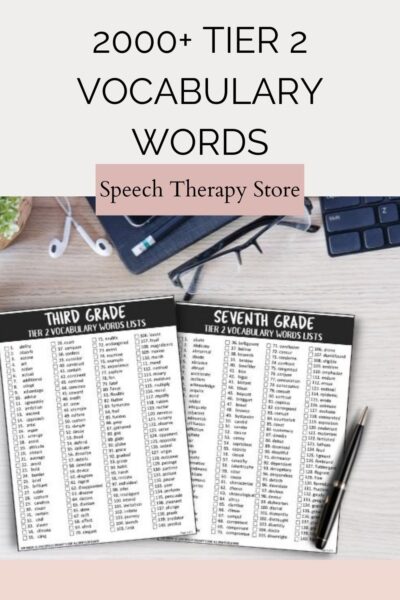
What are Tier 1 Vocabulary Words?
On the other hand tier 1 words are extremely common words, such as nouns and verbs that require minimal or no explicit teaching of their meanings.
These basic words are words that most native speakers can acquire simply through their daily experiences, such as reading or an everyday conversation with others.
These high-frequency words are typically root words with no prefix or suffix making their meanings very basic.
Examples of Tier 1 Words
For example, the words red, help, and look are all tier 1 words.
What are Tier 3 Vocabulary Words?
Lastly, tier 3 words are low-frequency words that are used in specific domains.
A specific domain or subject-specific area includes subjects in school, occupations, hobbies, etc.
Tier 3 words are central to a specific subject and should be taught within the context of that subject or domain.
Examples of Tier 3 Words
For example, the words algorithm and absolute value are all in the math content areas for tier 3 words.
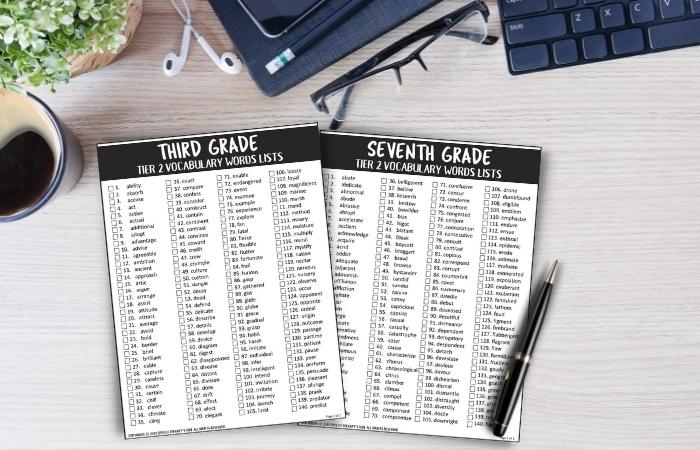
Vocabulary Instruction
When thinking about vocabulary development and what academic vocabulary words to teach your students focusing on tier 2 words is a great place to start.
With tier 1 words being common sight words that are frequently learned through daily experiences and with tier 3 words being low-frequency words that are domain specific it would be best to focus on tier 2 words.
Since tier 2 words are still considered high-frequency words unlike tier 3 words and need explicit instruction unlike tier 1 words it makes them the perfect set of academic words to focus on when thinking about which vocabulary words to teach this school year.
Focusing on tier 2 words is also a great idea for English language learners since these words are frequently used across multiple school subjects and different contexts.
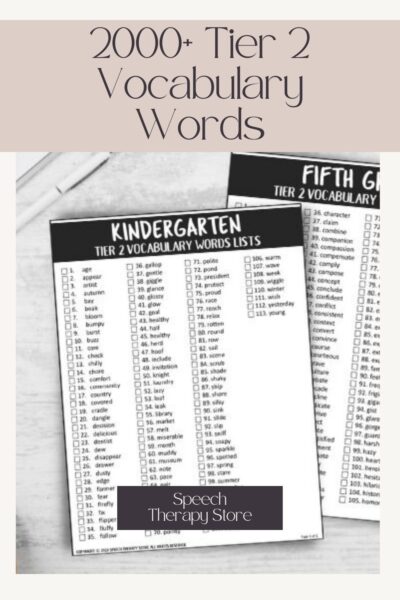
SEE ALSO: 430+ Free Multisyllabic Words List Activity Bundle
Grade Level: List of Tier 2 Vocabulary Words
Here is a list of words by grade level for working on tier 2 vocabulary words. With a high frequency of use tier 2 words make a great academic word list to work through.
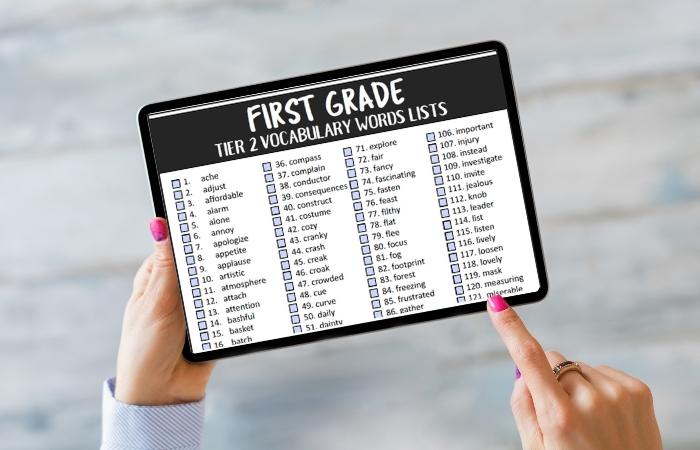
Kindergarten: Early Grades
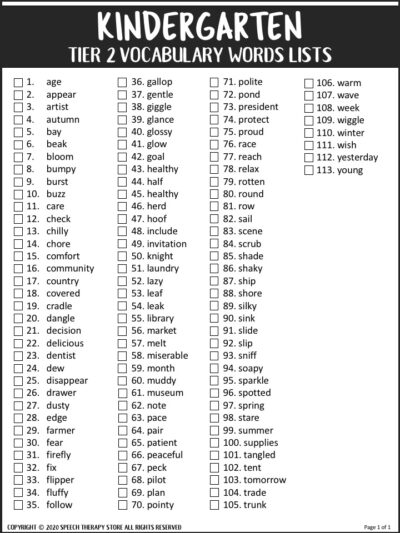
Tier 2 Vocabulary Words First Graders
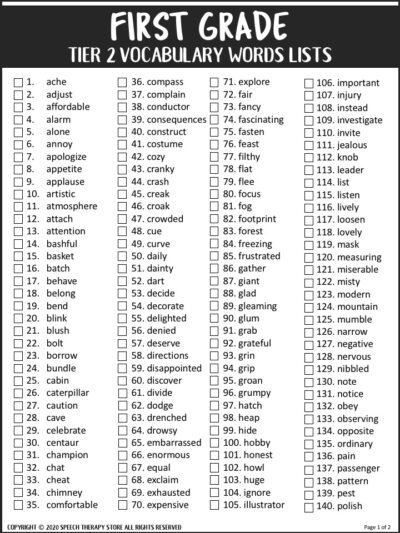
Tier 2 Vocabulary Words Second Grade
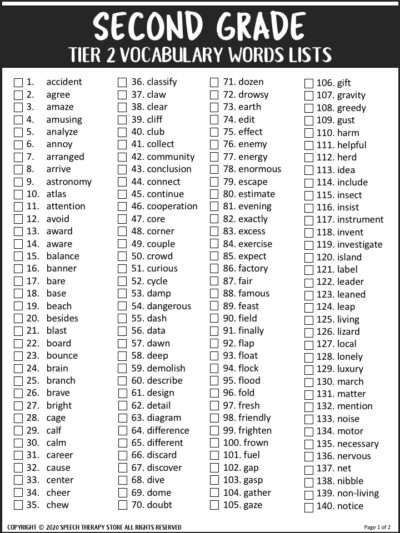
Tier 2 Vocabulary Words Third Grade
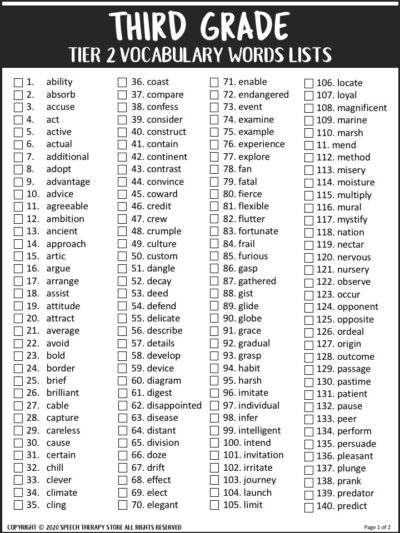
Tier 2 Vocabulary Words Fourth Grade
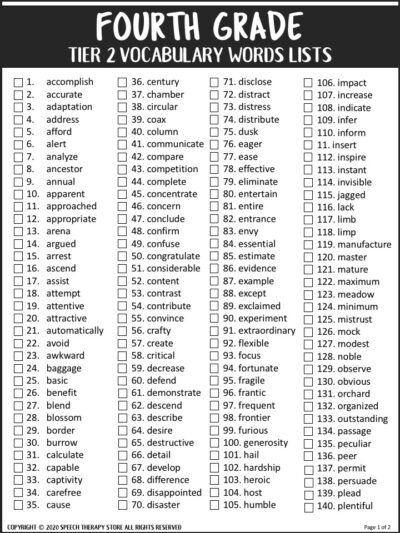
Tier 2 Vocabulary Words Fifth Grade
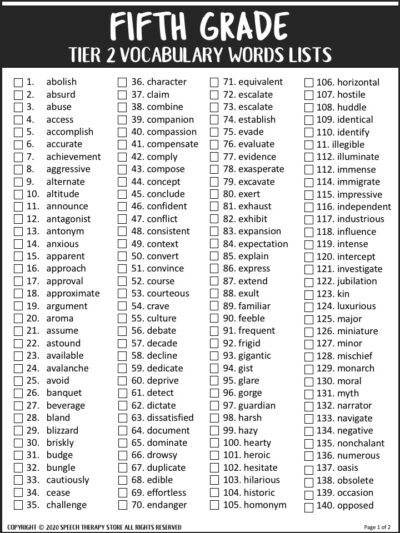
Tier 2 Vocabulary Words Sixth Grade
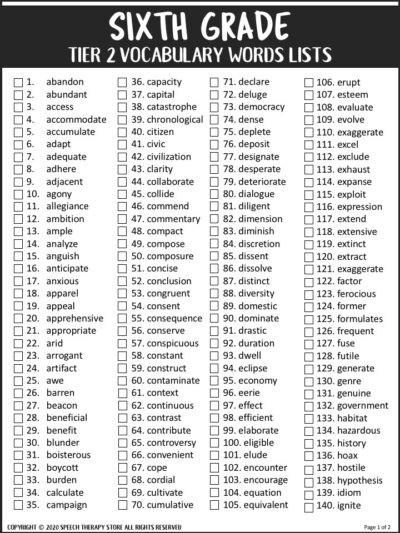
Tier 2 Vocabulary Words Seventh Grade
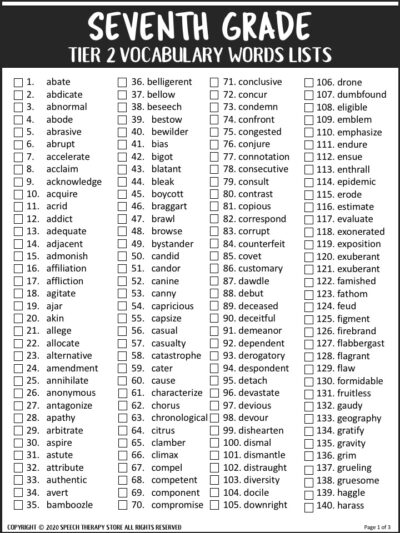
Tier 2 Vocabulary Words Eighth Grade
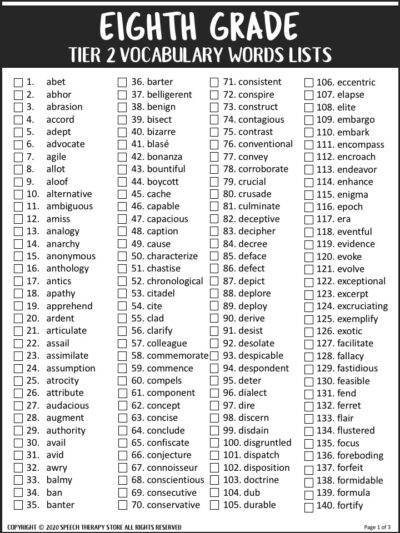
Older Students: Tier 2 Vocabulary Words
Tier 2 vocabulary words 9th grade.
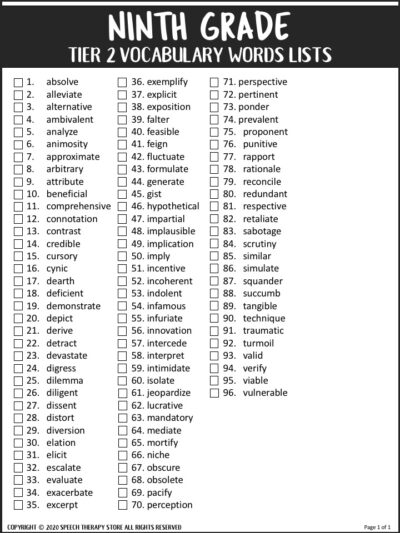
Tier 2 Vocabulary Words 10th Grade
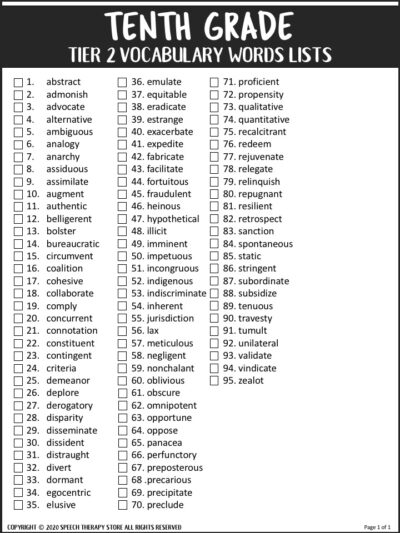
Tier 2 Vocabulary Words 11th Grade
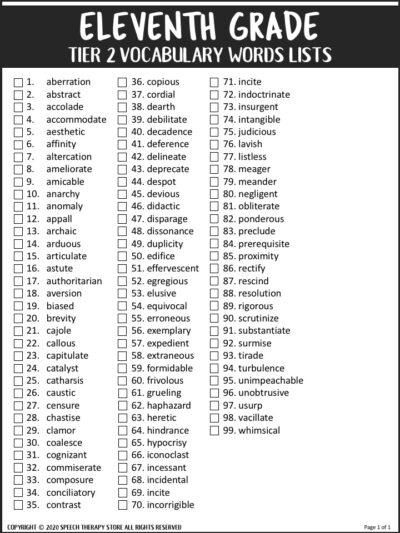
Tier 2 Vocabulary Words 12th Grade
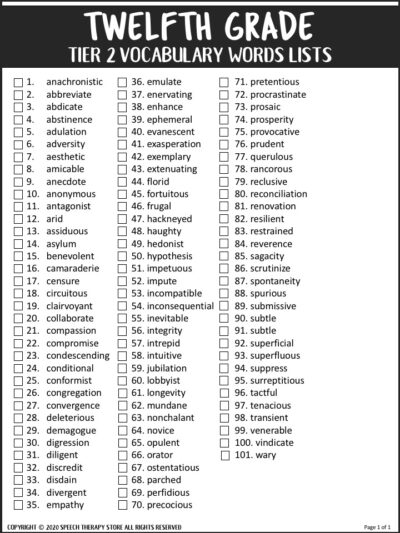
Lesson Plans
Again when it comes to vocabulary direct instruction it’s important to focus on the notion of tiers.
The different tiers of words help you decide which type of words to focus on.
There a lot of opportunities to learn tier 1 words simply through conversation and daily life making them less important to focus on and with tier 3 words for more mature language users and used in a specific field of study they are low-frequency words and less important to focus on as well.
That leaves us with tier 2 words as our key words to be focusing on to get our biggest bang for our buck.
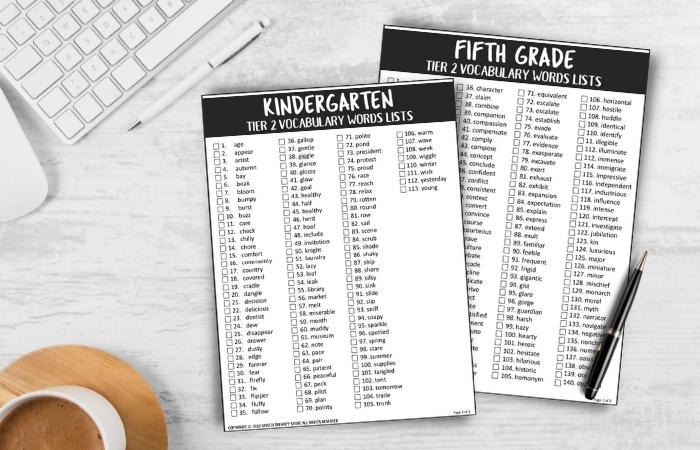
SEE ALSO: 179+ Free Speech Therapy Wh Questions Printable
Instruction of Tier 2 Words
I’ve spent the last year creating something very special for my community!
And I’m excited to announce in the month of August 2022 I’ll be releasing my newest tier 2 vocabulary resource.
Here is a sneak peek of what’s coming!
Are you in need of a year group vocabulary lesson plan? Each grade level bundle comes with 100 words giving you 2 pages per week for a 25-week school year lesson plan.
Practice using the vocabulary words in various contexts.
- Say the vocabulary word aloud.
- Write or typ e the vocabulary word.
- Read the word used in a sentence .
- Identify a synonym and/or antonym .
- Select the correct definition .
- Fill in the blank using your vocabulary word.
- Use the word in a sentence using the given real-life photos .
- Highligh t the context clu e.
- Select the correct definition based on the context clues given.
- Answering question s about your new vocabulary word.
The best part is practicing the vocabulary words in various ways from saying the word aloud, to selecting the correct answer, to creating your own definitions, to selecting the correct definition based on the context clues.

Tier 2 Vocabulary List PDF
Fill out the form below to grab your copy of tier 2 academic vocabulary words for grades Kindergarten through 6th grade. Looking for another fun idea? Create a grade-level word wall with your new words!
Grab your Free Tier 2 Vocabulary Lists!
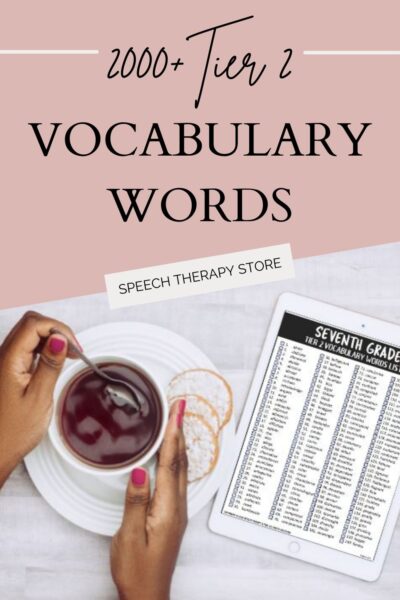
Frequently Asked Questions: Tier 2 Vocabulary Words
How do you know if a word is tier 2.
Tier 2 words are words that are of high frequency that are used across a variety of contexts and are not domain or topic specific.
What is the Difference Between Tier 2 and Tier 3 Words?
Tier 2 words are high-frequency words that can be used across multiple different subjects or topics while tier 3 words are low-frequency words and are domain specific. For example, infer and form are both tier 2 words while lava and DNA are both tier 3 words.
SEE ALSO: 193+ Multiple Meaning Words Grouped by Grade + Free Worksheets
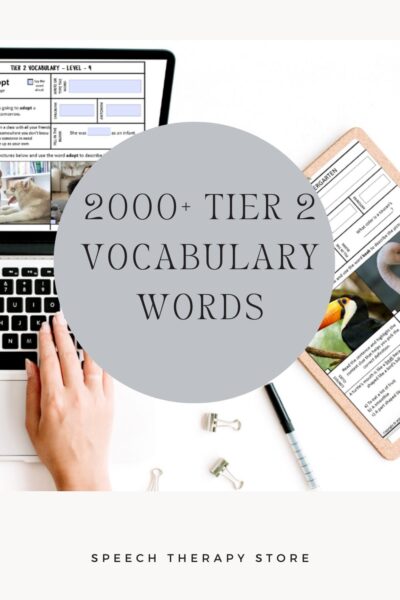
How Do you Teach Tier Two Words?
Practice using the vocabulary words in various contexts .
Is Rainbow a Tier 2 Word?
Even though the word rainbow is a common word frequently used in conversation and might be thought to be a tier 1 word it is also a domain-specific word and used to understand and describe a specific topic, therefore, it is considered a tier 3 word.
What is a Tier 3 Vocabulary Word?
Tier 3 words are those low-frequency words that are used in a specific domain or subject-specific area including subjects in school, occupations, hobbies, etc.
They are specialized words that are used in a specific domain and only have one meaning.
For example, the words algorithm and absolute value are all math-specific tier 3 words.
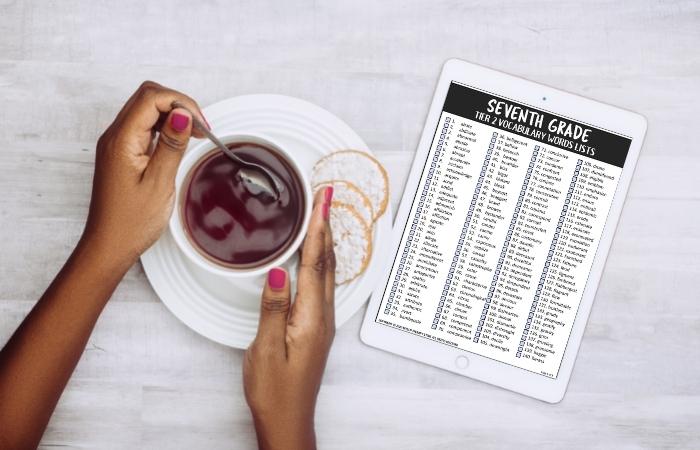
Fill out the Form Below to Get Your Free Copy!
Want even more language skills resources.
- 17 Best Vocabulary Goals + Free PDF Activities
- 430+ Free Multisyllabic Words List Activity Bundle
- 179+ Free Speech Therapy WH Questions Printable
- 133+ Categories List for Speech Therapy
- 33 Most Common Irregular Plurals Flashcards [Freebie]
Want the Best of the Bests?
Be sure to check out our most popular posts below!
- 21 Best Reinforcement Games for Speech Therapy / Teletherapy
- Best IEP Resources
- 71+ Free Social Problem-Solving Scenarios
- 432+ Free Measurable IEP Goals and Objectives Bank
- 279+ Free Speech Therapy Digital Materials
- 179+ Free Speech Therapy Wh-Questions Printable
Friday 10th of February 2023
Request grade levels 6 thru 12
Melissa Berg
Monday 13th of February 2023
Hi Gail, Thanks so much for reaching out! This post does include grades 6th-12th. I'm wondering if you're asking about my paid vocabulary product. Currently, my paid product includes grades K-6th. Wishing you all my best, Melissa
Ashley Dawkins
Tuesday 8th of November 2022
Do you have a complete PDF for each Core Vocabulary Tier?
Wednesday 9th of November 2022
Hi Ashley, I don't have a PDF for the individual Tiers. However, at the end of this post, I have a PDF of the Tier 2 words. Wishing you all my best, Melissa
Tuesday 4th of October 2022
Hi! This resource is great. I was wondering where you got these tier 2 vocabulary from. Thank you.
Wednesday 5th of October 2022
Hi Victoria, Great question! I wish there was one perfect source out there to give you, but the list was largely made from a combination of curriculum vocabulary words I got from working in the schools, which I then cross-referenced with grade-level standards and the below list of resources. Of course, the number of words I could have listed is quite large (especially for the later grades). So when created my product of 100 words per grade there was some degree of personal choice in the list where I chose words that I felt were most applicable to the academic setting. In other words, tier 2 words the students would most frequently use in an academic setting.
Here are a list of sources I used: The Academic Word List (AWL) was developed by Averil Coxhead at the School of Linguistics and Applied Language Studies at Victoria University of Wellington, New Zealand. The list contains 570 word families which were selected because they appear with great frequency in a broad range of academic texts. The list does not include words that are in the most frequent 2000 words of English (the General Service List), thus making it specific to academic contexts. The AWL was primarily made so that it could be used by teachers as part of a programme preparing learners for tertiary level study or used by students working alone to learn the words most needed to study at colleges and universities. The 570 words are divided into 10 sublists. The sublists are ordered such that the words in the first sublist are the most frequent words and those in the last sublist are the least frequent. Beck, Isabel L., McKeown, Margaret G., and Kucan, Linda. (2002). Bringing words to life. New York, NY: The Guilford Press Coxhead, Averil and Nation, Paul (2001) 'The Specialised Vocabulary of English for Academic Purposes'. In Flowerdew, J. and Peacock, M. Research Perspectives on English for Academic Purposes. Cambridge University Press: Cambridge Coxhead, Averil (2000) A New Academic Word List. TESOL Quarterly, 34(2): 213-238. Marzano, R. J. (2010). Teaching basic and advanced vocabulary: A framework for direct instruction. Boston: Heinle-Cengage. Marzano, R. J. & Pickering, D. J. (2005). Building Academic Vocabulary (Teacher’s Manual). ASCD Montgomery, Judy K. (2008). MAVA-Montgomery assessment of vocabulary acquisition. Greenville, South Carolina: Super Duper Publications, Inc. Montgomery, Judy K. (2007). Vocabulary Intervention for RTI: Tiers 1, 2, 3 Retrieved October 28, 2008, VOCABULARY INTERVENTIONS FOR RTI: TIERS 1, 2, 3 https://www.marzanoresources.com/reproducibles/vocab-common-core/ Select: Source List for Terms (must sign in to access list)
All my best, Melissa
Wednesday 21st of September 2022
Hi. Is there a way to obtain a complete PDF list of your 2000 + Core Tier 2 Vocabulary Words, complete from level K through 12?
Thursday 22nd of September 2022
Hi Monica, Yes, there is a PDF with a list of all the words. At the end of this post, there is a form for your name and email address. Simply fill in that form so the freebie can be emailed directly to your inbox. All my best, Melissa
404 Not found
CHECK OUT MY TIER 2 VOCABULARY INTERVENTION WITH RESEARCH, VISUALS AND MNEMONICS!
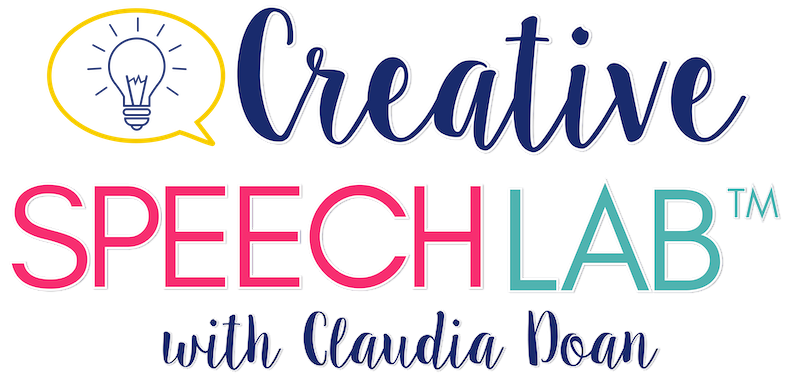
Top 5 Tips for Teaching Tier 2 Vocabulary
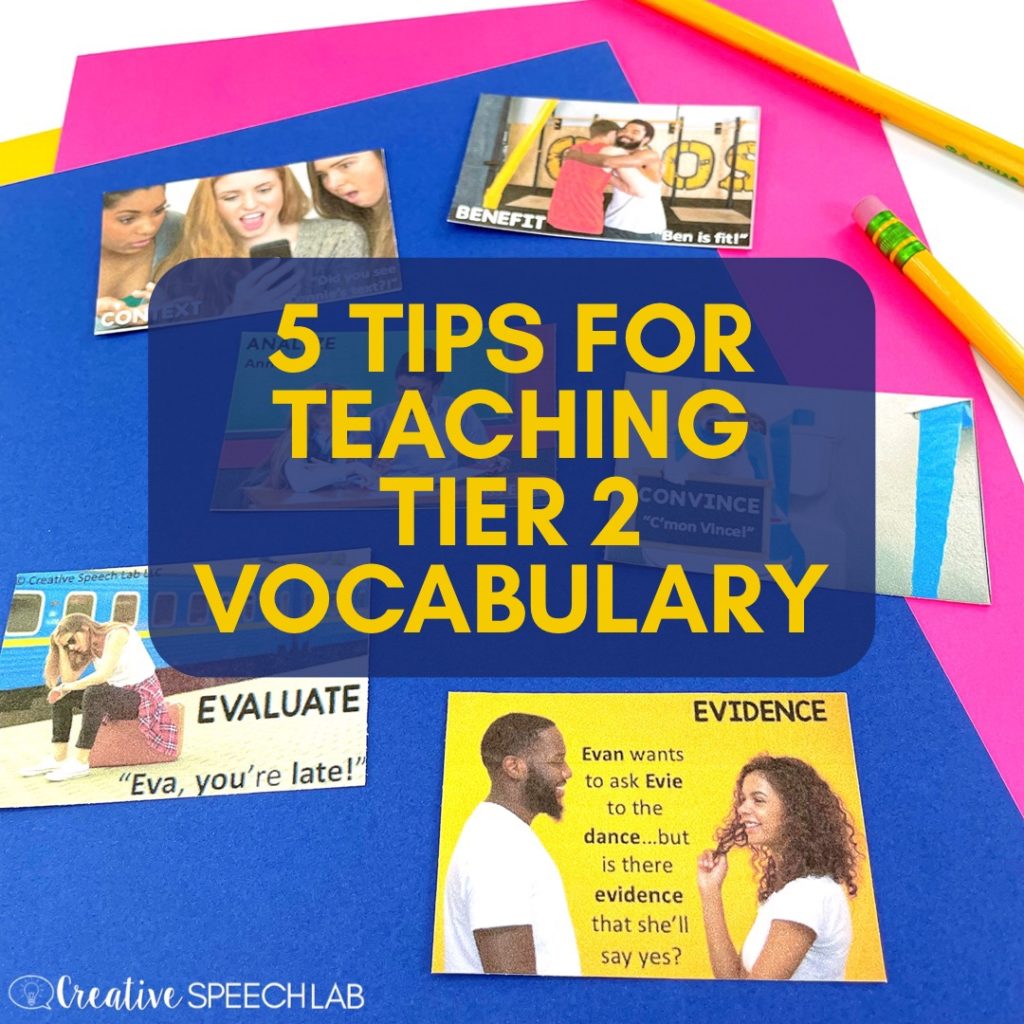
What does high quality vocabulary instruction look like to you?
Does it involve drill and repetition? Will it result in a list of words and definitions from the curriculum?
Today I’m sharing 5 critical pieces to effective Tier 2 vocabulary instruction.
Grab a FREE SAMPLE of my Tier 2 Vocabulary Intervention, so you can have a research-based activity ready at your fingertips, at the end of this post!
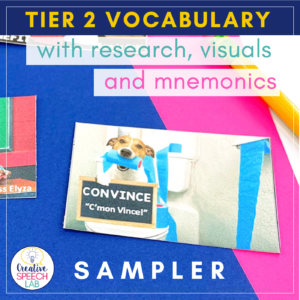
1. Vocabulary instruction is NOT a drill
Vocabulary is so much more than a printed definition memorized through drill. It’s living, breathing, colorful and experiential, (which is why I love it so much).
Not all kids have access to vocabulary-rich experiences. That’s why I’m passionate about incorporating experiential learning principles into therapy.
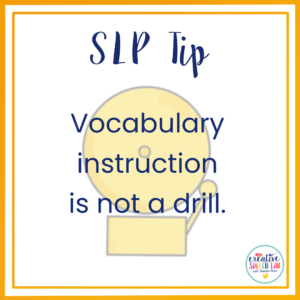
What are some examples of experiential vocabulary instruction?
- Teach vocabulary through field trips (in-person or free virtual ones!)
- Create a simple speech newspaper that involves researching vocabulary to generate a meaningful story.
- Teach vocabulary through a hands-on, project-based experience that follows my Rule of the 3 M’s (is the learning target motivating, meaningful and memorable in the context of the experience?)
2. Not all vocabulary words have equal importance in language intervention
As SLPs, we want to select meaningful vocabulary targets . It’s valuable to organize vocabulary into tiers, so we can think critically about the impact of our intervention.
Here’s a quick refresher related to the three main tiers we frequently use.
Tier 1: This type of vocabulary has the highest frequency of occurrence and is comprised of basic words (e.g. happy, boy, bird). Direct instruction is not usually required.
Tier 2: These words occur across domains and are important for reading comprehension. These words are more academic in nature (e.g. evaluate, measure, generous).
Tier 3: These words are related to highly specific areas or domains. They occur at a lower frequency (e.g. science vocabulary such as evaporation, condensation and precipitation).
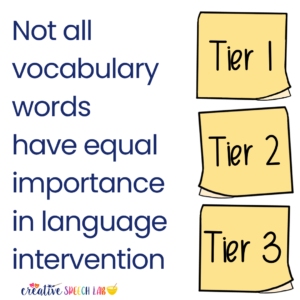
Can you guess which tier is generally my favorite to focus on? If you guessed Tier 2, you’re right!
3. Teach vocabulary found in instructions and questions
Evaluate, analyze, compare, assess, describe, summarize…
Do you think we should just focus on the reading passage or should we spend time on those directions and question words too?
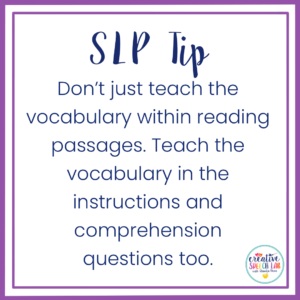
When I was a proctor for statewide testing, I sat beside my 6th grade student during a math test. It was eye-opening because I suddenly realized that she struggled with Tier 2 vocabulary.
After witnessing how Tier 2 vocabulary could affect a math score, it became clear that it could impact every subject.
So, here’s my simple tip for your older students. Grab assignments and tests from the classroom and highlight those words. Use them in therapy and it will have an impact.
4. Tier 2 Vocabulary is Cross-Curricular
Need another reason to love using Tier 2 vocabulary? It’s cross-curricular! I created this graphic to illustrate how it can carry over to so many areas.
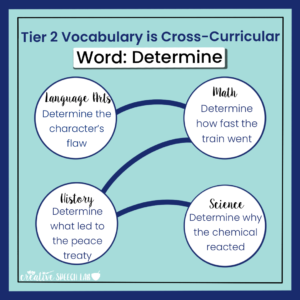
Check out my #SLPBigKids highlight on Instagram here to view my video about what the research suggests for effectively teaching Tier 2 Vocabulary to older kids!
5. Use High-Interest Vocabulary with your students
High-interest vocabulary can be a game-changer for older students. Engagement is everything!
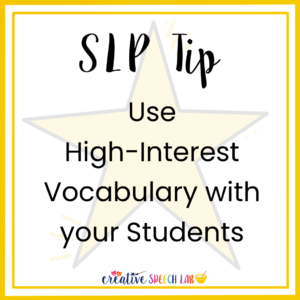
Think about which topics your students love and incorporate them. I created these High-Interest Nonfiction Passages to generate some excitement around learning, and it worked!
If you’re looking for a research-based resource that incorporates all of these elements, check out my Tier 2 Intervention with Research Visuals and Mnemonics!
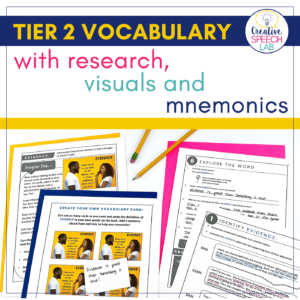
GRAB YOUR FREE SAMPLE IN THE FREEBIE LIBRARY BELOW!
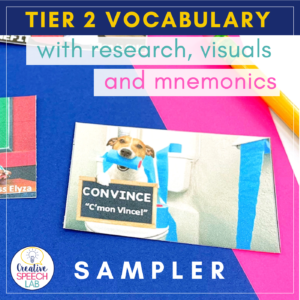
Freebie Library for YOU

Leave a Reply Cancel reply
Your email address will not be published. Required fields are marked *
I accept the Privacy Policy

Privacy Overview

- Material Requests
- My Bookmarks
- Articulation & Language Materials
- Cariboo Cards
- Dots and Smashmats
- Flashcards & Games: Single Sounds
- Flashcards & Games: Clusters
- Flashcards & Games: Multisyllabic Materials
- Flashcards & Games: R
- Flashcards & Games: Vowels
- Hidden Pictures
- Minimal Pairs
- Phonological Awareness
- Quick Data Decks
- Teaching Handouts
- Word Searches
- Worksheets & Sentence Level Practice
- Articulation & Language
- Compare Contrast
- Communication Boards
- Prepositions
- Late Talker
- Picture Stimuli
- Phrase & Sentence Expansion
- Social Language & Problem-Solving
- Story Grammar/Story Companions
- WH Questions
- Vocabulary Tier 1 & Teaching Materials
- Vocabulary Tier 2
- Multiple Meanings
- Fall: No Print
- Fall: Print
- Winter: No Print
- Winter: Print
- Spring: No Print
- Spring: Print
- Summer: No Print
- Summer: Print
- Disorders & Norms
- Homework & Motivation
- Private Practice & Documentation
- Screening & Progress
Oops! This material is part of the paid membership
If you would like to access this material and 3,222+ print and no-print materials, please join below.
All materials are instantly available for every payment plan.
Access to Speech Therapy Talk Membership
- Pay $25 every month
- Instant access to ALL web-based, print, and no-print materials
- Weekly emails with new materials & videos on how to use them in therapy
- webinars, tutorials, and facebook groups
- Cancel anytime with 3 clicks
PER 3 MONTHS
- Save $10 every 3 months
- Save $60 every year!
School District/Clinic Discount
$Save 30-50%
- 30-50% off depending on number of memberships
Student Discount
FOR THE FIRST YEAR
- Save $150 for first year!
Already a member? Login in below
Session expired
Please log in again. The login page will open in a new tab. After logging in you can close it and return to this page.
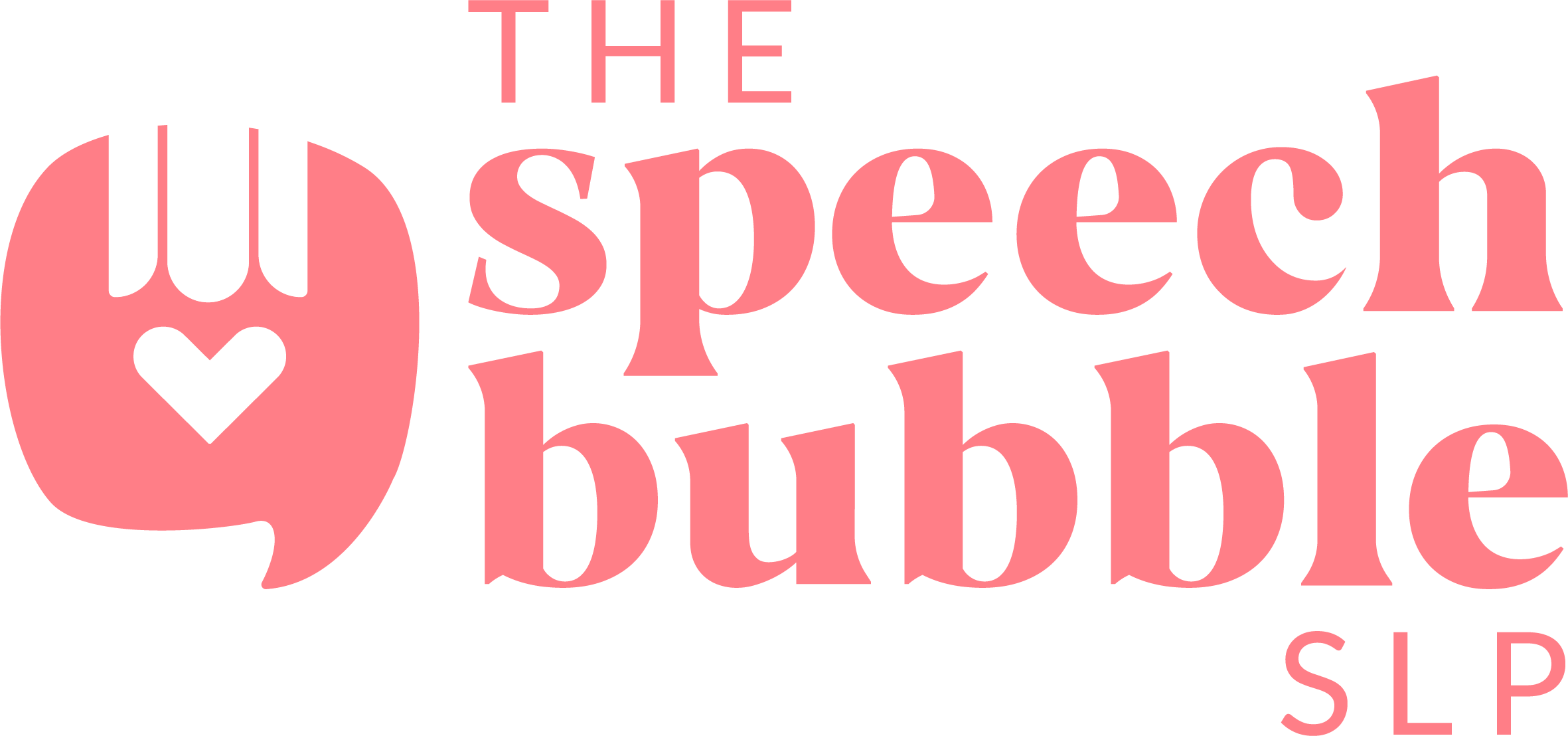
- Literacy Based Therapy
- Speech Sounds
The Bookshelf
Resource library, how to pick vocabulary words for speech therapy.
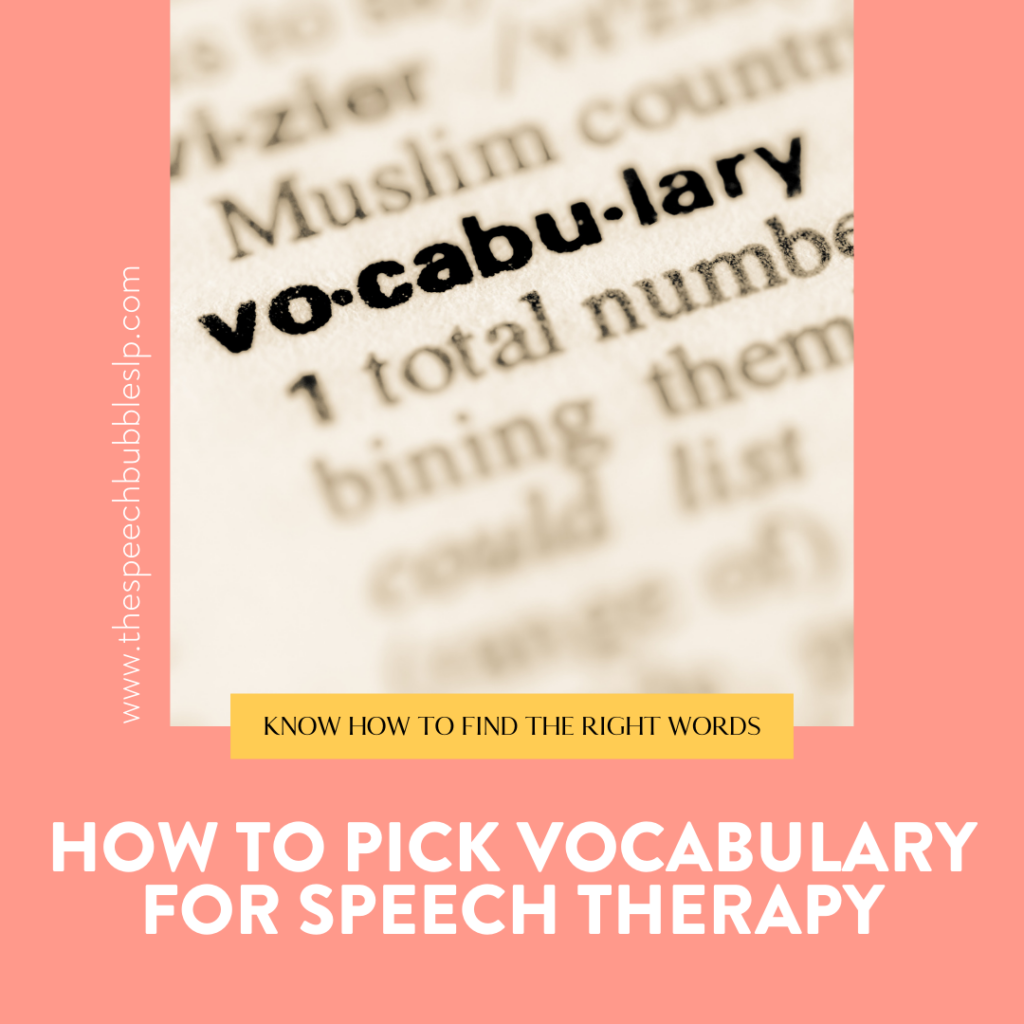
How to Pick Vocabulary Words: What words?! Whenever I had a student who needed to work on vocabulary My mind started racing, ‘What words do I pick?’ ‘What are the right words to use? ‘. When writing a goal we need to know what we are tracking. You cannot simply write with ‘classroom vocabulary’, that ain’t gonna fly if your case brought to due process.
You must have a list of the words you are going to target and track progress.
Now, there are lots of resources out there. I have read books like Bridge to Vocabulary , Bringing Words to Life , Building Academic Vocabulary , and Teaching Vocabulary and found them so valuable. These have been wonderful resources and I highly encourage you to check them out. A common theme across them all is to make the vocabulary meaningful for the child.
Explain why these words are so important,
point them out in daily living, show their actual application! Choosing the words to target when it comes to working on vocabulary doesn’t have to be an ordeal either. One of the best and most practical places to find words is to look at their academic worksheets, read the directions, and focus on the verbs. Words like arranging, summarize, incorporate, detail, etc will pop up left and right.
These are examples of tier 2, functional vocabulary words. I do not assume that the students know these words despite having been surrounded for years. So, if you’re stumped on what words to choose, start here.
“Failure to understand instructional verbs and thus what a teacher or textbook is asking of a child has the potential of creating a rift in the child’s engagement with the learning process.” Lowman et al., 2018
Now, one of the most common questions after hearing this, ‘What verbs are the best to target then?’. So here is a list of instructional verbs, common for Kindergarten to 5th grade. Please keep in mind there are soooo many words available that our students are exposed to everyday, but if you need a jumping off point, then take a look at the list below.
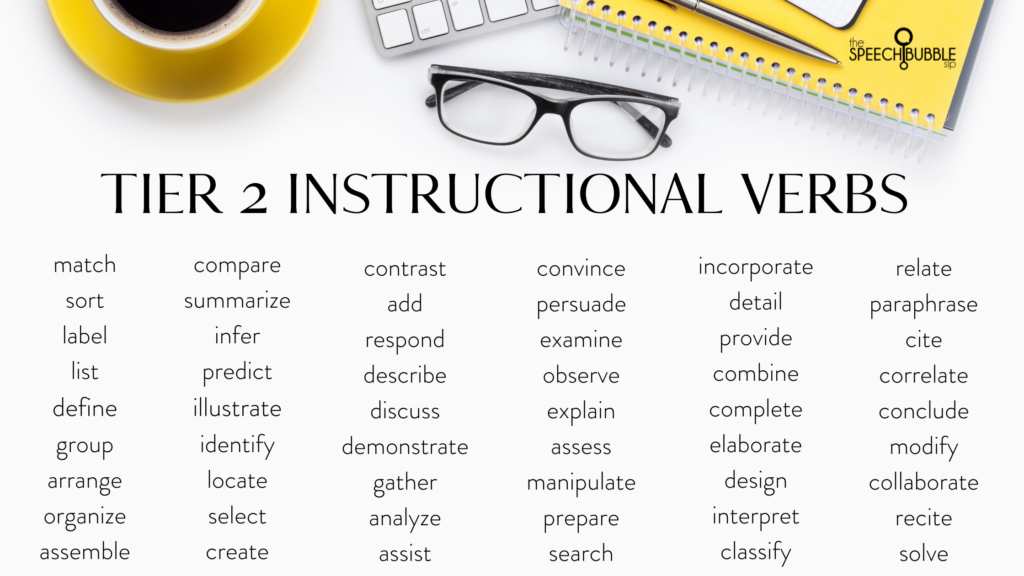
I have also used these Vocabulary Kits with a lot of success too. I simply pick a word set and that is our focus for the year. The are research based so the vocabulary chosen aligns with the same academic practicality we need. This also includes scaffolded materials as well as a pretest/post-test. You can read more about this my Teaching Vocabulary in Speech Therapy post.
So when it comes to vocabulary, don’t stress. Words your kids need surround them all you have to do is to find the best fit for them.

Lowman, J., Stone, L. T., & Guo, J. (2018). Effects of interactive book reading for increasing children’s knowledge of instructional verbs. Communication Disorders Quarterly , 1-13. doi:10.1177/1525740117745639 .
You might like these products
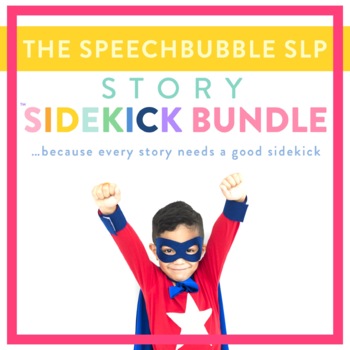
Story Sidekick Bundle
Language Rubrics
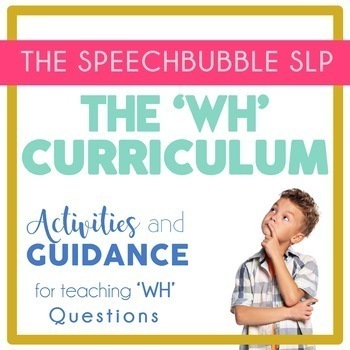
The 'WH' Curriculum Bundle
Share this post.

Meet Maureen
Hey there! I’m Maureen Wilson, a school-base SLP who is data driven and caffeine powered. My passion is supporting other pediatric SLPs by teaching them how to harness the power of literacy and data to help their students achieve their goals…without sacrificing time they don’t have.
- Organization

Get the basics you need to administer and analyze Dynamic Assessments in a school setting. Dynamic Assessments are great for:
- Assessing student’s language learning
- Assessing student’s with multi-lingual backgrounds
- Getting practical information to make confident decisions on eligibility and goals
Featured Products
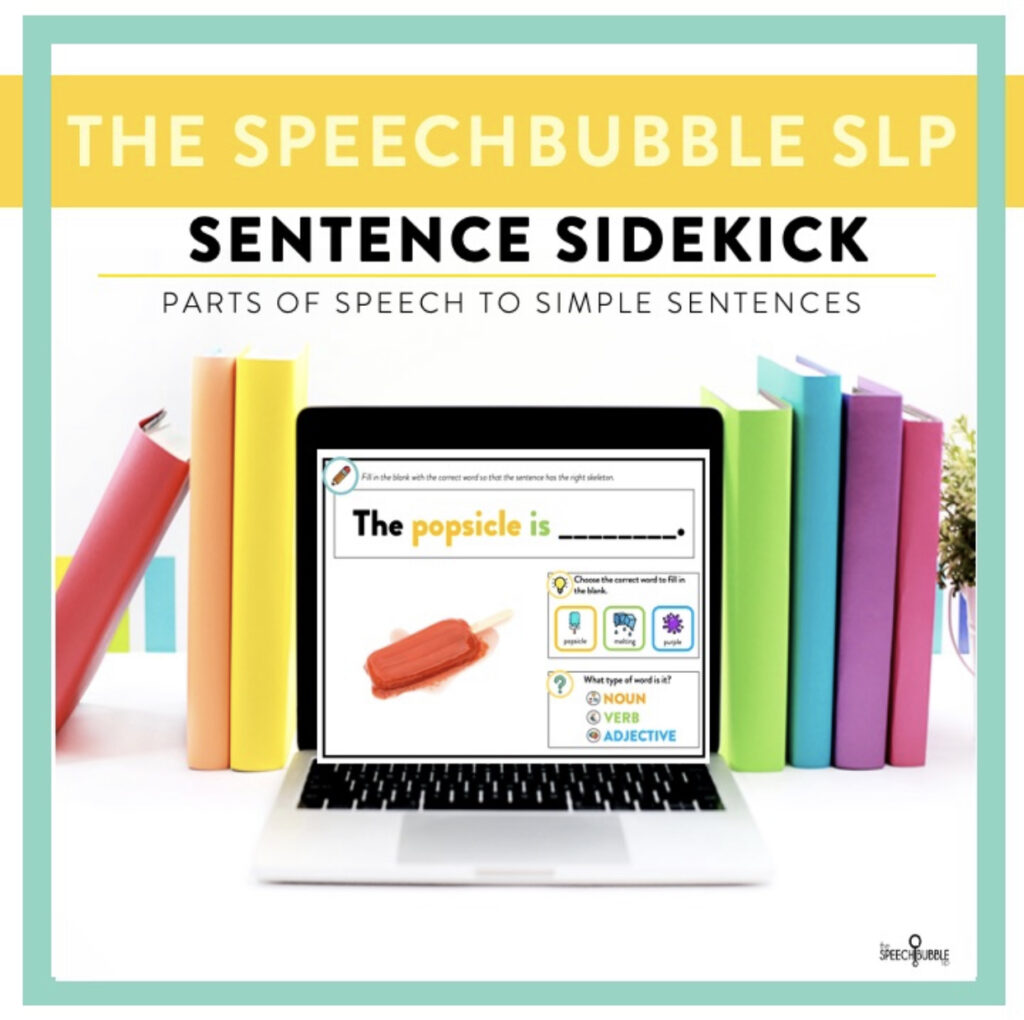
Sentence Sidekick Bundle
Language rubrics: a progress monitoring and data tracking tool, you might also enjoy....
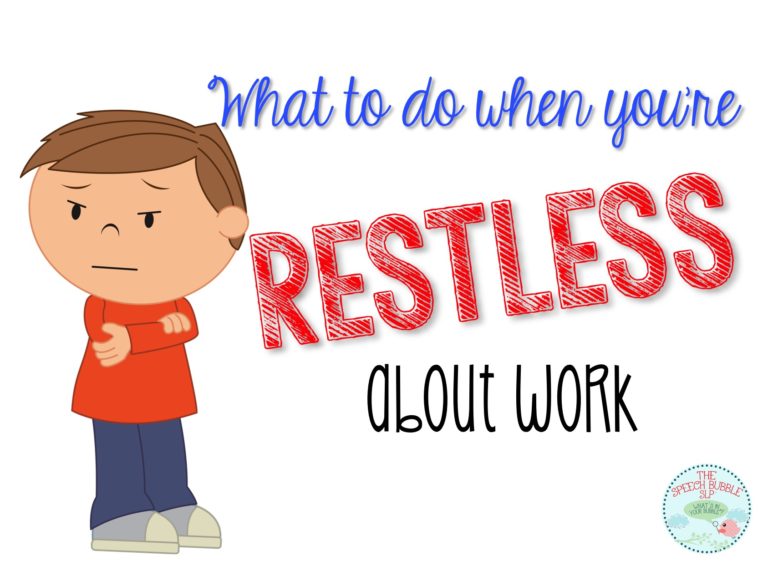
What to do when you’re restless about work
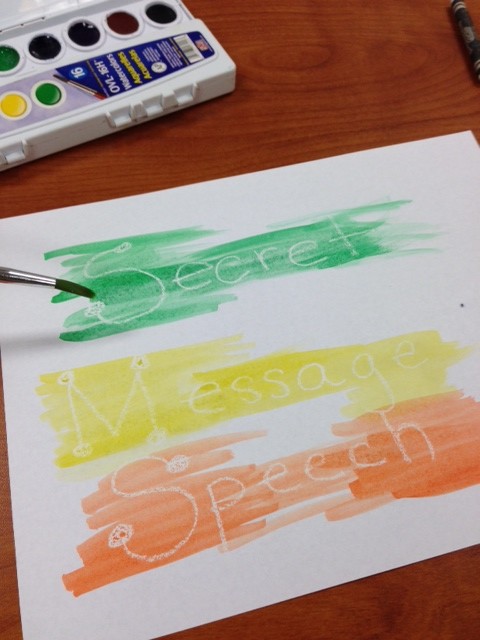

Secret Message Speech
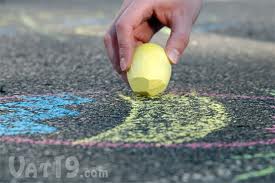
Outdoor Activities for Speech
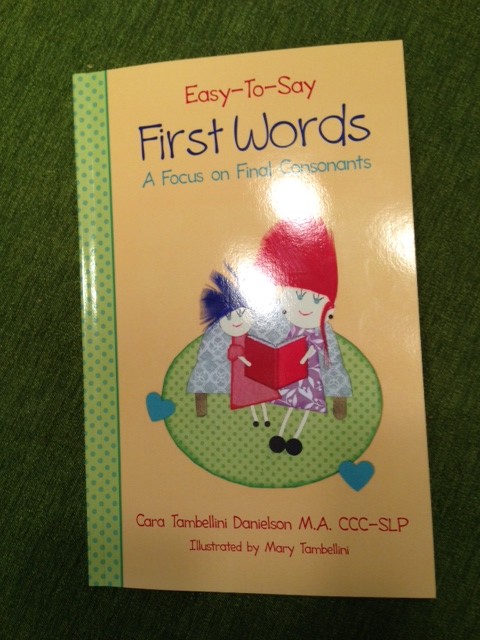
Easy-To-Say First Words: A Focus on Final Consonants {Book Review}
5 responses.
- Pingback: Tracking Vocabulary Data in Speech Therapy - The Speech Bubble
- Pingback: How to Stay Organised with Speech Therapy- The Speech Bubble
Awesome! Thank you so much for this information.
Thank you for sharing your expertise in this area. Your insights in this tiopic is very valuable and useful for SLPs like me who tries to squeeze out every precious minute out of their day for getting new ideas and ways of doing a well-used skill in fresh, new ways. The flashcards are certainly more than ready to retire, hahahahahaha!
- Pingback: Animal Island AILA Sit & Play Preschool Learning System Essential fo – Look Toys
Leave a Reply Cancel reply
Your email address will not be published. Required fields are marked *
Save my name, email, and website in this browser for the next time I comment.
Notify me of follow-up comments by email.
Notify me of new posts by email.

©2022 The Speech Bubble SLP. All Rights Reserved.
Designed by ashley hughes..

Tips and Tricks for Building Tier 2 Vocabulary Words In Speech Therapy
Want to help your students build vocabulary that can help them in all subject areas.

Did you know there are three tiers of vocabulary?
Yes! Tier 1 is common, everyday words. Tier 2 are words that help students in all subject areas, found on standardized tests, and will help students year after year. Tier 3 words are content specific and important for classroom units and exams.
Why should we focus on tier 2 in vocabulary?
- Time. We don't have time to cover every vocabulary word in every subject and make it stick. We only see them several times a week.
- Carryover. We want them to transfer what we work on in our therapy rooms into their classrooms.
- Independence and compensatory strategies. We want them to know how to figure out vocabulary words when we are not around. These are the words they will run into in any subject or grade.
- Mixed groups. We can't always cater to a specific classroom's needs. We may have students working on different units at the same time.
Why should we focus on vocabulary?
Studies have shown that poor readers benefit from explicit instruction of vocabulary, not just the words in the text.
Elleman, A.M., Steacy, L.M., Olinghouse, N.G., Compton, D.L. (2017). Examining Child and Word Characteristics in Vocabulary Learning of Struggling Readers. Scientific Studies of Reading . Advance online publication. doi:10.1080/10888438.2016.1265970
Vocabulary instruction is important for students of all ages, not just our younger ones. Evidence has shown association with vocabulary knowledge and academic attainment. This study showed working on tier 2 vocabulary words in a systematic way can help students build vocabulary knowledge and transfer into their classrooms.
Spencer, S., Clegg, J., Lowe, H., & Stackhouse, J. (2017). Increasing adolescents’ depth of understanding of cross-curriculum words: an intervention study. Advance online publication. doi: 10.1111/1460-6984.12309.
How can we work on tier 2 vocabulary?
You can pull out tier 2 vocabulary words in texts being used. You can do this easily with VocabGrabber. Click HERE to read my entire blog post about it. What can you do with these words?

You can play various games to assess if they have the background knowledge of these words already. Can they use it in a sentence? Can they identify the parts of speech? Click HERE to see my whole blog post on this plus a freebie list of words!

If they are unfamiliar, you can teach them using context clues. I like to start with nonsense words! Below I just used a piece of paper and quickly jotted down a sentence and omitted the word. What is the sentence about? What part of speech do you think this word is? Can we think of various possibilities of this word?

Practice! Practice having them use their strategies of context clues, parts of speech, and understanding prefixes, suffixes and root words to assist them! My Building Vocabulary for Older Students is designed to work on context clues and parts of speech! Click HERE to check it out!
View my video below from my Facebook Live on the topic!
Related Posts

- Privacy Policy
- Book A Live Event
- SLP Elevate
- Speech Retreat
- Ella Bella Book

Tiered Vocabulary and Speech Therapy
- allisonfors
- February 18, 2023
- One Comment
- Literacy , Speech Therapy Education

Do you ever wonder what types of vocabulary to focus on in speech therapy sessions? Read for the basics of tiered vocabulary in education.
Not all words have equal importance in language instruction – A word’s frequency of use, complexity, and meaning determines which tier it will fall into. Most children will enter school knowing Tier 1 words. Tier 2 words are most commonly used for direct instruction in education. And Tier 3 words are low-frequency and niche.
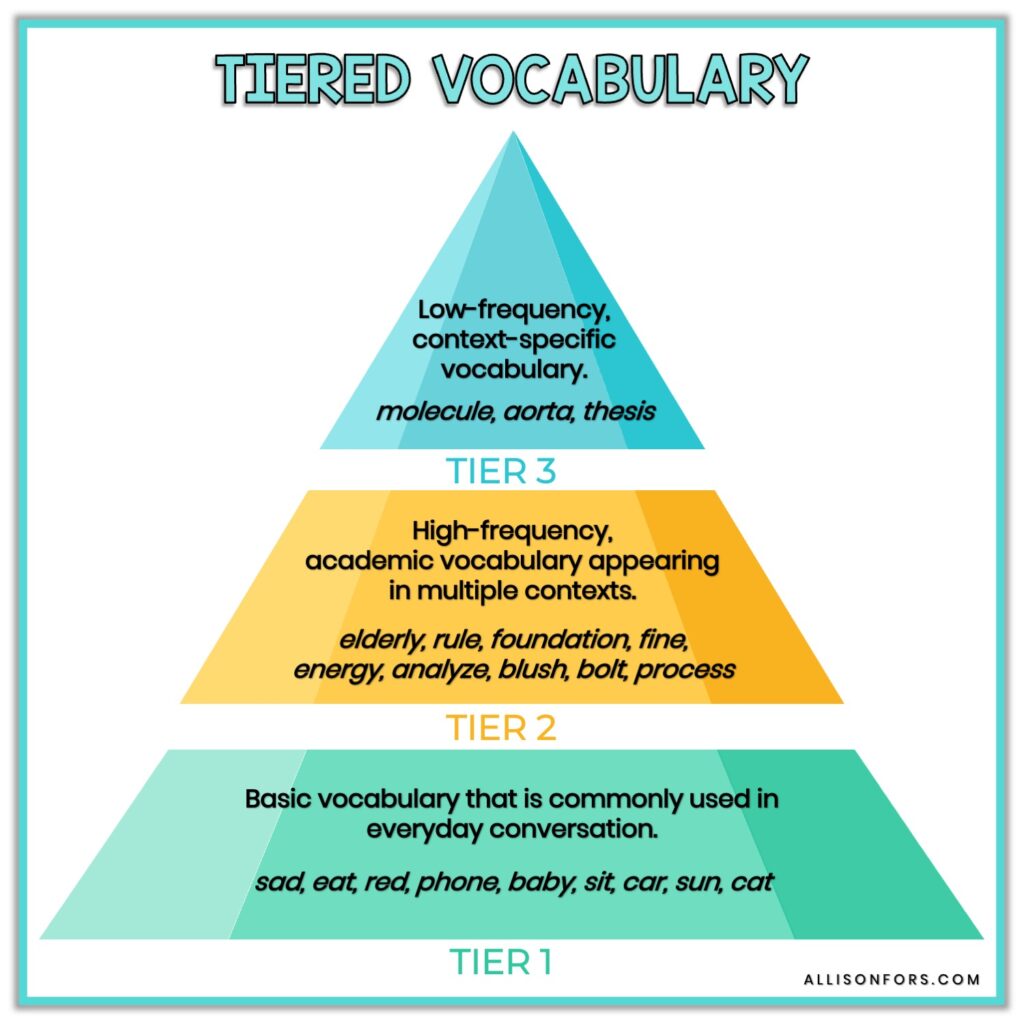
TIER 1: These words are commonly used in everyday conversation. They include sight words, nouns, verbs, and adjectives.
Examples: sad, eat, red, phone, baby, sit, car, sun, cat
TIER 2: These words are not widely used in speech and daily conversation. Instead, they are often used and found in books and written text, and often have multiple meanings.
Examples: elderly, rule, foundation, fine, energy, analyze, blush, bolt, process
TIER 3: These words are low-frequency and occur within specific contexts, such as school subjects, occupations, and hobbies. They have distinct meanings and purposes.
Examples: molecule, aorta, thesis , economics, isotope, asphalt
Tier 2 words are most used for direct instruction in education. These are typically the words we focus on in language instruction because they are:
- important for reading comprehension
- contain multiple meanings
- used across a variety of environments
- characteristic of mature language users
- allow for increased descriptive vocabulary
Tier 2 Vocabulary Examples:
Kindergarten:
First Grade:
- investigate
- uncomfortable
Second Grade:
Third Grade:
Fourth Grade:
- appropriate
- automatically
- competition
- manufacture
Fifth Grade:
- alternative
- expectation
TIP: Communicate with your student’s teachers about word lists they are using in their classes to teach various subjects.
Have any tips for working on tiered vocabulary?
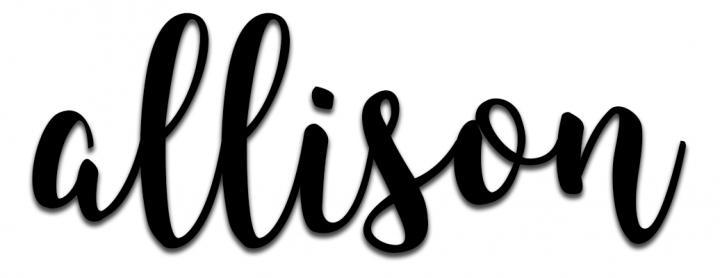
If this post was helpful, please share it!

One Response
This is an extremely helpful blog post! I love the tier 2 examples listed by grade level!
Leave a Reply Cancel reply
Your email address will not be published. Required fields are marked *
You Also Might Like...

7 Prepositions Activities for Speech Therapy
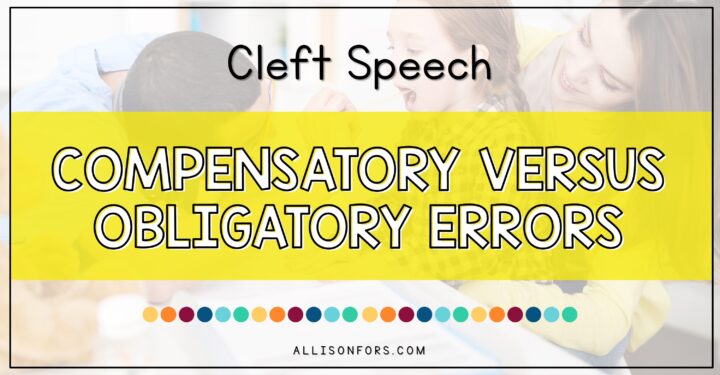
Compensatory Errors Versus Obligatory Errors in Cleft Speech
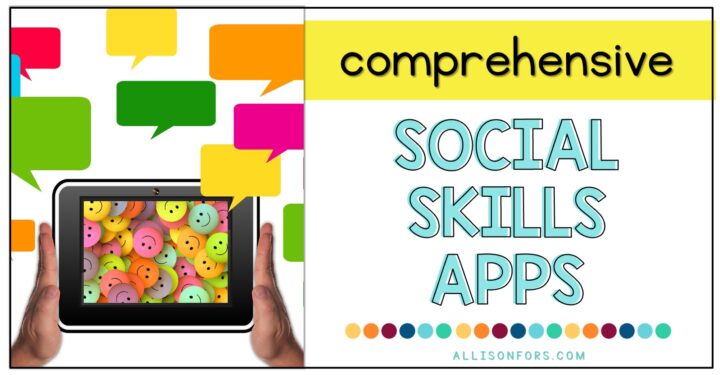
7 of the Most Comprehensive Social Skills Apps
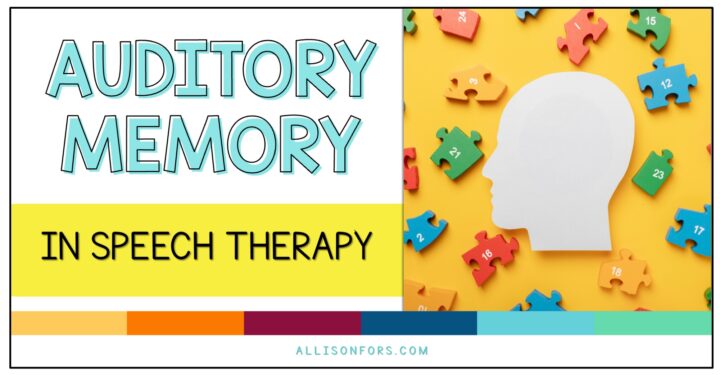
Auditory Memory and Processing in Speech Therapy

COPYRIGHT © 2024 · ALLISON FORS, INC.
TERMS & CONDITIONS
PRIVACY POLICY
Any call to action with a link here?

Core Vocabulary Speech Therapy: Get Started Guide for SLPs
Are you wondering how to use core vocabulary in speech therapy? Are you not quite sure what core vocabulary is, and why you might want to consider addressing it in your speech and language therapy sessions? In this blog post, I’m sharing a “get started” guide for SLPs interested in using core vocabulary in speech and language therapy. I’m also sharing a few of my favorite speech therapy resources for modeling core vocabulary.

What is Core Vocabulary?
The definition of core vocabulary.
Core vocabulary basically means “the most frequently used words in conversation”. These are words like “more”, “go”, “stop”, “turn”, “on”, “off”, “that” and “want”, to name just a few. Core vocabulary includes adjectives, prepositions, verbs, and pronouns. Core vocabulary does not include nouns- nouns are considered “fringe vocabulary”. Fringe vocabulary can be very important as well. However, in this blog post, I want to specifically address core vocabulary.
How to Model Core Vocabulary in Speech Therapy Sessions
The wonderful thing about core vocabulary is that you really don’t need to plan any special activities for your speech therapy session. And that can be a great thing, especially because child-led therapy sessions can be the best! I’m going to provide a few examples of using core vocabulary during specific activities in this section to hopefully get your creative SLP juices flowing!
Reading a Book
You can model core vocabulary in speech therapy sessions while reading a book to your student. This doesn’t need to be complicated. If you’re turning a page, use the word “turn”. Describe what you’re seeing in the book. Words like “look” and “that” are perfect for this. Use basic prepositions, like “in” or “on”, to describe the location of objects you see in pictures.
Use Core Vocabulary While Using a Sensory Bin in Speech Therapy
Sensory bins are SO much fun, and they can be a wonderful way to model core vocabulary during your speech therapy sessions. You can hide your hands “in” the rice, sand, or whatever filler you’re using. You can “look” for and “find” objects, small toys, or picture cards that you have hidden in the bin. While you’re doing this, you can model the question word, “Where?”
Use Core Vocabulary During Movement-Based Speech Therapy Activities
It’s easy to use words like “go” and “stop” when paired with a trampoline- or try riding a bike! You can also use words like “fast” and “slow” to describe the speed of the action being performed.
Use Core Vocabulary While Playing with Toys
It’s easy to model words like “go”, “stop”, “turn”, “open”, “in”, and “out” while playing with toys! We put pieces “on” the potato toy, shapes “in” the shape sorter, and make a tower of blocks fall “down”.

Need more ideas for your speech therapy sessions?
A while back, I blogged about modeling language using a toaster toy .
I wrote a blog post for ASHA about how to incorporate core vocabulary and AAC in the classroom setting , and you might want to read that article if you’re just getting started! I also created these core vocabulary handouts that are perfect to give to teachers and parents.
To sum up this article, though, core vocabulary is wonderful because it can be used with any activity. Model the word “turn” when turning a page in a book, or turning on a light.
Target the word “go” while making toy cars go. You could also talk about where puzzle pieces “go”, or where the shapes “go” into a shape sorter toy. You just want to make sure you’re talking about everything that’s happening, and modeling the vocabulary on the board or device as you go (or via whatever communication system or method the child is using)!
Core Vocabulary and Communicative Functions
Core vocabulary can be used to express a variety of communicative functions. In order words, core vocabulary can be used to request, request recurrence, comment, ask questions, answer questions, describe, label, protest, and more.
Easy Ways to Incorporate Core Vocabulary into Speech Therapy Sessions
SLPs who have students using a multimodal approach to communication will likely want to target core vocabulary, whether using signs, words or word approximations, or high-tech or low-tech AAC . There are a variety of AAC options available.
There are many “chaotic” times during the school day. Sometimes, students have many activities and worksheets on their desks. That’s why I created a low-tech communication option called “ AAC on my Desk “. This is a very unique low tech AAC option, and is a perfect “backup” for high-tech AAC. This board was designed with core vocabulary that can be placed around other activities or worksheets on a student’s desk.
This “communication board” allows for motor planning, as the location of the core vocabulary targets never change. This is similar to the idea of typing on a keyboard- the placement of the keys never change. Additionally, there are fringe vocabulary (nouns) strips to assist the student with school-specific activities throughout the day.
This core vocabulary communication board makes AAC quick and practical- just place it on desks, and if you’d like, secure it with contact paper. This is a quick, easy way to ensure the students have access to core vocabulary in the classroom or in speech therapy sessions.
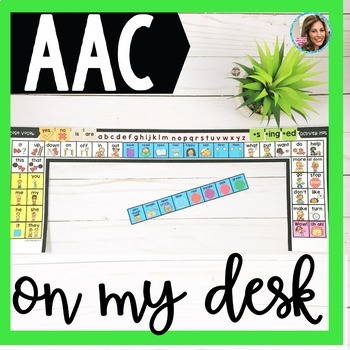
Core Vocabulary in Carrier Phrases
If you’re wanting to target expanding utterances in speech therapy, you can do this with a focus on core vocabulary. Earlier in this post, I mentioned just a few examples of core vocabulary ( “more”, “go”, “stop”, “turn”, “on”, “off”, “that” and “want”).
Perhaps your student is moving beyond single words. You could create simple phrases and sentences using core vocabulary to expand utterance length using those vocabulary targets. Here are some examples:
- “Want that” (a child could use this along with pointing gesture to request an item or activity)
- “Want more” (a child could use this to request more of an item or activity)
- “Turn on” or “Turn that on” (you could model this while turning on lights or music)
- “Turn that” (you could use this while turning a dial or a toy)
You can build utterance length using the communication method or system already in place for your student. I also created this core vocabulary carrier phrases and sentences resource . These are picture sentence strip visuals that focus specifically on core vocabulary.

Core Vocabulary for Speech Therapy Summary
In conclusion, core vocabulary can be very beneficial to target in your speech therapy sessions.
You can get started by purchasing the AAC on my Desk communication board , or these carrier phrase sentence strips . Oh, and one more thing! If you’re looking to get parents involved, don’t forget to grab these handouts .
Similar Posts

60 Quick What Questions for Speech Therapy (WH-Questions)
Speech-language pathologists frequently target wh- questions in speech therapy. This article contains 60 what questions for speech therapy that speech pathologists can use during speech therapy sessions. These speech therapy questions contain basic questions and more complex questions. The different questions provided will make it easier to use across your caseload of varying needs and…
Core Words in Speech Therapy
Using core words in speech therapy can be a very important component when helping our speech and language students become more efficient communicators. The problem? Most SLPs have huge caseloads- and even larger paperwork piles. That means we can’t be the only ones involved when it comes to modeling and teaching core words to our…

The BEST Free Online Speech Therapy Games, Tools, and Websites
Speech therapists looking for free online speech therapy games will want to check out this blog post! This blog post contains a collection of interactive games and online resources that will be motivating for younger children AND older students! There are links to digital games and reinforcers, such as tic tac toe, online checkers, digital…
How To Do a Childhood Apraxia of Speech Evaluation
If you are a speech language pathologist who is wondering how to do a childhood apraxia of speech evaluation, check this article out! This is meant to be a get-started guide for apraxia evaluation with resources, tips, and examples. This is useful for pediatric SLPs and school SLPs who work with younger children. This post…

Speech Therapy for a Lisp (Ultimate SLP Guide)
Speech pathologists treating speech sound disorders will no doubt want some tips and ideas for correcting a lisp in speech therapy. Many different speech errors are addressed in articulation therapy, and correct production of s and z requires some skill and hard work to accomplish. While your coworkers and the internet may offer good advice,…
Here’s How I Teach Grammar & Sentence Structure in Speech Therapy
grammar and syntax speech therapy ideas
Evidence-Based Blog and Materials for SLPs!
- $ 0.00 0 items
Effective Vocabulary Instruction: What SLPs Need to Know

Teachers and SLPs frequently inquire regarding effective vocabulary instruction methods for children with learning disabilities. However, what some researchers have found when they set out to “examine how oral vocabulary instruction was enacted in kindergarten” was truly alarming.
In September 2014, Wright and Neuman , analyzed about 660 hours of observations over a course of 4 days (12 hours) in 55 classrooms in a range of socio-economic status schools.
They found that t eachers explained word meanings during “teachable moments” in the context of other instruction.
They also found that teachers:
- Gave one-time, brief word explanations
- Engaged in unsystematic word selection
- And spent minimal time on vocabulary devoted to subject areas (e.g., science and social studies in which word explanations were most dense)
They also found an economic status discrepancy, namely:
Teachers serving in economically advantaged schools explained words more often and were more likely to address sophisticated words than teachers serving in economically disadvantaged schools .
They concluded that “ these results suggest that the current state of instruction may be CONTRIBUTING to rather than ameliorating vocabulary gaps by socioeconomic status .”
Similar findings were reported by other scholars in the field who noted that “teachers with many struggling children often significantly reduce the quality of their own vocabulary unconsciously to ensure understanding.” So they “reduce the complexity of their vocabulary drastically.” “For many children the teacher is the highest vocabulary example in their life. It’s sort of like having a buffet table but removing everything except a bowl of peanuts-that’s all you get “. (Excerpts from Anita Archer’s Interview with Advance for SLPs )
It is important to note that vocabulary gains are affected by socioeconomic status as well as maternal education level. Thus, children whose family incomes are at or below the poverty level fare much more poorly in the area of vocabulary acquisition than middle class children. Furthermore, Becker (2011) found that children of higher educated parents can improve their vocabulary more strongly than children whose parents have a lower educational level.
Limitations of Poor Readers :
Poor readers often lack adequate vocabulary to get meaning from what they read. To them, reading is difficult and tedious, and they are unable (and often unwilling) to do the large amount of reading they must do if they are to encounter unknown words often enough to learn them.
Matthew Effect, “rich get richer, poor get poorer”, or interactions with the environment exaggerate individual differences over time. Good readers read more, become even better readers, and learn more words. Poor readers read less, become poorer readers, and learn fewer words. The vocabulary problems of students who enter school with poorer limited vocabularies only exacerbate over time.
However, even further exacerbating the issue is that students from low SES households have limited access to books. 61% of low-income families have NO BOOKS at all in their homes for their children ( Reading Literacy in the United States: Findings from the IEA Reading Literacy Study, 1996. ) In some under-resourced communities, there is ONLY 1 book for every 300 children. Neuman , S., & Dickinson, D. (Eds.). (2006) Handbook of Early Literacy Research (Vol. 2) . In contrast, the average middle class child has 13+ books in the home.
The above discrepancy can be effectively addressed by holding book drives to raise books for under privileged students and their siblings. Instructions for successful book drives HERE .
So what are effective methods of vocabulary instruction for children with language impairments?
According to (NRP, 2000) a good way for students to learn vocabulary directly is to explicitly teach them individual words and word-learning strategies .
For children with low initial vocabularies, approaches that teach word meanings as part of a semantic field are found to be especially effective (Marmolejo, 1991).
Many vocabulary scholars (Archer, 2011; Biemiller, 2004; Gunning 2004, etc.) agree on a number of select instructional strategies which include:
- Rich experiences/high classroom language related to the student experience/interests
- Explicit vs. incidental instruction with frequent exposure to words
- Establishing word relationships
- Word-learning strategies to impart depth of meaning
- Morphological awareness instruction
Response to Intervention: Improving Vocabulary Outcomes
For students with low vocabularies, to attain the same level of academic achievement as their peers on academic coursework of language arts, reading, and written composition, targeted Tier II intervention may be needed.
Tier II words are those for which children have an understanding of the underlying concepts, are useful across a variety of settings and can be used instructionally in a variety of ways
According to Beck et al 2002, Tier II words should be the primary focus of vocabulary instruction, as they would make the most significant impact on a child’s spoken and written expressive capabilities.
Tier II vocabulary words
- High frequency words which occur across a variety of domains conversations, text, etc.
- Contain multiple meanings
- Descriptive in nature
- Hostile, illegible, tolerate, immigrate, tremble, despicable, elapse, etc.
According to Judy Montgomery “You can never select the wrong words to teach.”
Vocabulary Selection Tips:
- Make it thematic
- Embed it in current events (e.g., holidays, elections, seasonal activities, etc)
- Classroom topic related (e.g., French Revolution, the Water Cycle, Penguin Survival in the Polar Regions, etc)
- Do not select more than 4-5 words to teach per unit to not overload the working memory (Robb, 2003)
- Select difficult/unknown words that are critical to the passage meaning, which the students are likely to use in the future (Archer, 2015)
- Select words used across many domains
Examples of Spring Related Vocabulary
Adjectives:
- Flourishing
- Regeneration
Idiomatic Expressions :
- April Showers Bring May Flowers
- Green Thumb
- Spring Chicken
- Spring Into Action
Creating an Effective Vocabulary Intervention Packets and Materials
Sample Activity Suggestions:

- Vocabulary Page (list of story embedded words their definitions, and what parts of speech the words are)
- Multiple Choice Questions or Open Ended Questions Page
- Crossword Puzzle Page
- Fill in the Blank Page
- True (one word meaning) Synonym/Antonym Matching Page
- Explain the Multiple Meaning of Words Page
- Create Complex Sentences Using Story Vocabulary Page
Intervention Technique Suggestions :
1.Read vocabulary words in context embedded in relevant short texts
2.Teach individual vocabulary words directly to comprehend classroom-specific texts (definitions)
3.Provide multiple exposures of vocabulary words in multiple contexts, (synonyms, antonyms, multiple meaning words, etc.)
4.Maximize multisensory intervention when learning vocabulary to maximize gains (visual, auditory, tactile, etc.)
5.Use multiple instructional methods for a range of vocabulary learning tasks and outcomes (read it, spell it, write it in a sentence, practice with a friend, etc.)
6.Use morphological awareness instruction (post to follow)
- An ability to recognize, understand, and use word parts (prefixes, suffixes that “carry significance” when speaking and in reading tasks
Conclusion :
Having the right tools for the job is just a small first step in the right direction of creating a vocabulary-rich environment even for the most disadvantaged learners. So Happy Speeching!

Helpful Smart Speech Resources :
- Creating A Learning Rich Environment for Language Delayed Preschoolers
- Vocabulary Intervention: Working With Disadvantaged Populations
- The Water Cycle: A thematic language activity packet for older students
- The Checklists Bundle
- Narrative Assessment and Treatment Bundle
- Social Pragmatic Assessment and Treatment Bundle
- Assessment Checklist for Preschool Children
- Assessment Checklist for School Children
- Auditory Processing Deficits Checklist for School Aged Children
4 thoughts on “ Effective Vocabulary Instruction: What SLPs Need to Know ”
This is a fantastic blog post! Vocabulary instruction is one of my professional goals this year, and I am very excited to see so much research included in one place. I really appreciate you gathering so many strategies that can be implemented in the classroom. Thank you!
[…] a strong vocabulary is key to success in all academic areas. This article brilliantly underlines the importance of effective vocabulary instruction and gives pra… for direct vocabulary instruction. In the article, the author quotes vocab expert Dr. Anita […]
[…] classrooms of low achieving students. This allowed me to research quite a bit regarding the principles of vocabulary teaching as well as gave me an opportunity to adapt and design my own vocabulary intervention […]
[…] I noted in my previous post on effective vocabulary instruction (HERE): “teachers with many struggling children often significantly reduce the quality of their own […]
You must be logged in to post a comment.
- Adolescents (28)
- Ankyloglossia (1)
- APD Validity (7)
- App Review (18)
- Articulation (17)
- Assessment (118)
- Autism (19)
- behavior strategies (14)
- Bell Curve Charting (3)
- Bilingual (17)
- Blogging About Research (25)
- Book Companion (10)
- CEUs/CMHs (4)
- Checklist (23)
- Childhood Apraxia of Speech (6)
- Clinical Assessment (19)
- Clinical Fellows (1)
- CMH Quiz (1)
- Context Clues (3)
- Contextual Intervention (8)
- Controversial Practices in Health Care (7)
- Critical Thinking (22)
- Cues and Prompts (4)
- Development milestones (16)
- Developmental Disabilities (12)
- Differential Diagnosis (20)
- Down Syndrome (6)
- Dysgraphia (7)
- Dyslexia (35)
- Dyslexia Assessment (12)
- Dyslexia/Reading Disability (30)
- Early Intervention (18)
- Elementary (32)
- emotional and behavioral disturbances (34)
- Emotional Intelligence (5)
- Evidence-Based Practice (EBP) (50)
- Executive Function (15)
- Facebook (7)
- Fairy Tales (1)
- feeding (3)
- Following Directions (2)
- Fragile X Syndrome (3)
- Freebie (13)
- genetic syndromes (14)
- Giveaway (71)
- Independent Educational Evaluations (IEEs) (13)
- Insight (15)
- insurance coverage (2)
- Intake forms (6)
- internationally adopted children (28)
- Kindergarten (11)
- language delay (74)
- Language Disorder (68)
- language stimulation (30)
- Learned Helplessness (1)
- Learning Disability (55)
- Life Skills (3)
- listening comprehension (29)
- Literacy (42)
- Metacognition (4)
- Metalinguistics (12)
- Middle School (24)
- Morphological Awareness (8)
- Motor Speech Disorders (5)
- multicultural (24)
- Multisensory Stimulation (9)
- Narratives (10)
- News Release (44)
- NJAC 6A:14-3.6 (1)
- Nonfiction Text (2)
- orofacial assessment (4)
- Parent Consultation (4)
- Parent Tips (2)
- Phonemic Awareness (24)
- Phonics (9)
- Phonological Awareness (16)
- Picture Books (11)
- preschoolers (52)
- Problem Solving and Verbal Reasoning (34)
- Processing Disorders (25)
- Professional Consultation (2)
- Professional Development (3)
- Psychiatric Impairments (3)
- Reading Comprehension (19)
- Reading Fluency (17)
- Report Writing Tips (12)
- resource websites (33)
- Review (37)
- Rewards (1)
- Russian (6)
- Science of Reading Literacy Certificate for SLPs (1)
- Screening (1)
- Search Tips (2)
- Sequencing (2)
- Severe Disabilities (12)
- SLP Efficiency Bundles (3)
- Smart Speech Therapy Article (77)
- Social Communication (25)
- social pragmatic language (70)
- Social Thinking® Products (2)
- Special Education Disputes (14)
- speech language pathology (208)
- Speech-Language Report Tutorials (12)
- SPELL-Links/Learning By Design (3)
- Spelling (12)
- stuttering (5)
- Summer Learning Loss (1)
- Test Review (16)
- Thematic Intervention (13)
- Toddlers (12)
- Tongue Tie (1)
- Translanguaging (5)
- Treatment Suggestions (112)
- Trivia Night (5)
- Video Modeling (1)
- Vocabulary (42)
- Wh- Questions (2)
- word-finding (12)
- Writing (16)
Upper Level Vocabulary | Worksheets, Strategies | Speech Therapy Middle School

What educators are saying
Also included in.
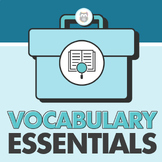
Description
Some days at the middle school level feel like one big vocabulary lesson. I needed a better, more complete way to teach a wide variety of vocabulary skills and, most importantly, strategies !
My students needed strategies that they could use in their classrooms to understand and remember important vocabulary. I created this curriculum to teach important tier 2 vocabulary words AND strategies that work on increasing vocabulary AND word finding skills.
The following is included in this packet:
- 100 worksheets targeting a variety of age-appropriate, functional, academically relevant vocabulary (200 pages – print front and back)
- 2 worksheets for each word
- 1 editable version (in a separate PowerPoint file) to customize with relevant vocabulary from your school’s curriculum if desired
- Five informal assessments (2 pages each) with progress monitoring/data sheets
- A progress monitoring rubric
- Several visuals with varying levels of information (students can rate their understanding of a word and learn different vocabulary strategies)
- Google Slides™️ versions of the worksheets!
- Editable text boxes on every worksheet so it's easy to use digitally!
The following skills are targeted throughout the packet:
- Hearing, using, and identifying the vocabulary word in a variety of ways including writing it, speaking it, and identifying it among other words
- Syllable identification
- Learning root words, prefixes, and suffixes
- Using context clues to understand the vocabulary word’s meaning in sentences
- Defining the vocabulary word in your own words
- Using word families to better understand target words
- Understanding parts of speech and how the part of speech can change from prefixes/suffixes/other morphological features
- Naming and identifying synonyms, antonyms, and multiple meaning words
- Using the word in functional, real life applications
»»» For more information about the research behind this product, how I selected the target words, and to see a video showing many pages of the product, please click here .
Important Notes:
- The worksheets generally progress in difficulty, however your students might vary in their ability to understand vocabulary in each set and level depending on their familiarity with each word.
- Even if students understand the vocabulary word, the skills taught on the worksheet are relevant and necessary skills to learning future unknown vocabulary words in their curriculum.
- The worksheets take 10-30 minutes each (depending on how much discussion there is) and allow for some independent work that can be checked and monitored by the SLP making them perfect for both individual, group and classroom based sessions.
- This packet works incredibly well to target a variety of skills making it great for mixed groups! I use it to target vocabulary, grammar, sentence formulation, articulation (look how many /r/, /s/, and /l/ words are targeted) and much, much more. Get creative!
Please download the preview to see examples of the worksheets, assessment forms, data collection forms and some of the included visuals.
Click here to see goals ideas and learn more about direct vocabulary instruction!
Feel free to email the Speechy Musings team at [email protected] with any questions!
☟ Let's stay in touch! Sign up for my email newsletter and follow me on social media to hear about freebies, new product releases, and helpful ideas for your therapy room! ☟
Sign up for my email newsletter ! • Join my Facebook group ! • Follow me on Instagram and Facebook !
Questions & Answers
Speechy musings.
- We're hiring
- Help & FAQ
- Privacy policy
- Student privacy
- Terms of service
- Tell us what you think

Understanding Speech Therapy & ABA Terms

Erin Vollmer MS, CCC-SLP
- May 14, 2024
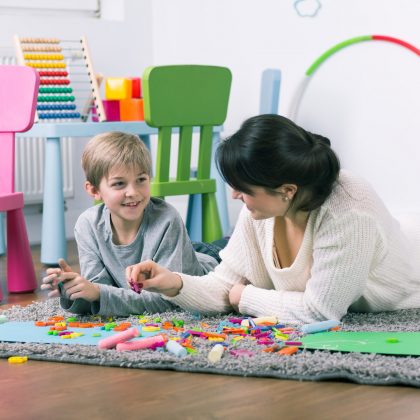
Speech therapy and ABA often work hand-in-hand to address communication difficulties in children. These services have the potential to improve several areas of a child’s development.
According to research , parents can help improve a child’s outcomes while receiving these interventions by participating in their child’s therapy. When parents are actively involved in the process, they’re able to learn the goals, strategies, and therapeutic techniques that can be used to help the child continue to practice and make gains at home.
However, treatment notes and discussions with the therapists can be loaded with unfamiliar terminology like antecedent, manding, prompting, shaping, and praising . Within the fields of speech therapy and ABA, distinct terminology is used.
We’ll help bridge the gap here by providing a clear understanding of the commonly used terms in speech therapy and ABA, and a look at the difference between some seemingly similar terms.
“Manding” vs. “Requesting”
Manding: In ABA, this refers to a child asking for a desired object or activity. Depending on the child’s language skills, mands can be verbal (saying a word) or nonverbal (such as through gestures or pictures). Developing manding skills through prompting and reinforcement is a common goal in ABA.
Requesting : In speech therapy, “requesting” refers to several different forms of communication that a child may use to ask for something, and can include direct requests as well as indirect requests within social situations This could be by saying a word or using nonverbal communication such as pictures, signs, gestures, or an AAC (Augmentative Alternative Communication) device.
The Difference
The goal of teaching “manding” in ABA is often to replace a negative or undesired behavior with a functional means for a child to ask for something. It is often targeted through behavioral interventions. “Requesting” in speech therapy can include a broader range of communicative acts and is elicited through speech and language interventions.
In ABA: Shaping is used to gradually teach and refine behaviors. Successive approximations of the target behavior are reinforced.
In speech therapy: In speech therapy, shaping often refers to gradually improving the accuracy that specific speech sounds are articulated by the child. The term is also used to refer to techniques used to help a child gradually develop a specific communication skill.
Example: Fluency shaping strategies (such as speaking at a slow rate) aim to help those who stutter to speak more fluently. Or, to teach a child to say consonant blends like the “sp” sounds in “spill”, the speech therapist may start by working on the child’s production of the “s” sound, then gradually blending it with the “p” sound.
"Shaping" in ABA is geared towards developing behaviors, and in speech therapy is used to develop an improved use and accuracy of speech and language skills.
“Reinforcement”
In ABA: Reinforcement can be positive (providing something desired) or negative (removing something undesired). It refers to a consequence that increases the likelihood of a behavior occurring again in the future.
In speech therapy: The speech therapist uses various forms of reinforcement such as verbal praise, tangible rewards, and natural consequences (like being able to successfully communicate a message). This is provided during play, games, or communication tasks to encourage and motivate the child to engage in the activity and practice certain speech and language skills.
In ABA, reinforcement is a key component of modifying a child’s behaviors to teach desired behaviors and reduce undesired ones. Reinforcement in speech therapy is used both to encourage the child to participate in therapeutic activities and to reinforce communication skills.
More Vocabulary to Know
Antecedent: Something that occurs before a behavior which may trigger that behavior.
Consequence: What happens after a behavior. The consequence can be positive, reinforcing the behavior to happen again, or negative, reducing the likelihood of the behavior occurring again.
Baseline: An initial measurement of behaviors before any intervention occurs. Baseline data is used as a reference to measure progress over time.
Functional Behavior Assessment (FBA): An evidence-based process of gathering and analyzing information to help identify why a child may be performing certain behaviors.
Behavior Intervention Plan (BIP): A formal, written improvement plan created based on the results of the FBA, which specifies recommended actions for improving or replacing certain behaviors.
Natural Environment Teaching (NET): A personalized teaching method that involves teaching skills in a child’s natural environment (such as in their home) and following the child’s lead.
Speech therapy
Prompt/Cue: A strategy used to help a child perform the desired speech or language skill. For example, to lead a child into answering a “why” question, he or she can be prompted with the starter phrase “because…”. Cues like touching the mouth or reminding the child to move their mouth a certain way can help them say a specific speech sound the correct way.
Accuracy: How well the child uses a certain communication skill. This is often a percentage (ex: the accuracy he or she produces a sound).
Modeling: A strategy used in speech therapy that involves the therapist or caregiver demonstrating a correct speech or language skill for a child.
Generalization: The ability to use a skill learned in one context (such as a speech therapy session, with the therapist) to different situations (like at home with family or on the playground with peers). A goal in speech therapy is to generalize a child’s speech and language skills across contexts.
Additional Resources
TherapyWorks offers ABA and Speech Therapy, in addition to Occupational and Physical Therapy both in person (in Illinois, Michigan, and Ohio) and through teletherapy (nationwide). If you would like to learn more, or discuss your child’s specific needs, please don’t hesitate to reach out to TherapyWorks!
Cihon, J. H. (2022). Shaping: A Brief History, Research Overview, and Recommendations. Handbook of Applied Behavior Analysis Interventions for Autism: Integrating Research into Practice , 403-415. DOI: https://link.springer.com/chapter/10.1007/978-3-030-96478-8_21
Leafe N, Pagnamenta E, Taggart L, et al What works, how and in which contexts when supporting parents to implement intensive speech and language therapy at home for children with speech sound disorder? A protocol for a realist review BMJ Open 2024;14:e074272. doi: https://doi.org/10.1136/bmjopen-2023-074272
Freeburn, J. (2022). Speech therapy: being understood clearly. In Functional Movement disorder: an Interdisciplinary case-based approach (pp. 341-352). Cham: Springer International Publishing. DOI: https://link.springer.com/chapter/10.1007/978-3-030-86495-8_25
Related posts

Reasons Parents May Seek ABA for Their Child

Your Child Received an Autism Diagnosis. What’s Next?

Insurance Coverage for ABA Services
Therapyworks.
p: (312) 780-0820 f: (877) 716-4799 [email protected]
- Our therapists
- Join our team
- Get Started
Enter your email below to receive our monthly newsletter.
" * " indicates required fields
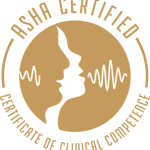

Tier 2 Vocabulary Curriculum - 3rd Grade
Couldn't load pickup availability
TAKE THERAPY PLANNING OFF YOUR TO DO LIST WITH THESE NO-PREP, SHORT AND SIMPLE VOCABULARY 3rd GRADE MATERIALS!
Image saving yourself hours of prep time every week and freeing up your time and energy to do more of what you love - being an SLP!
The bundle includes 3rd grade tier 2 vocabulary words and is differentiated at two different levels.
WHAT SKILLS ARE INCLUDED...
- Language: Say the vocabulary word aloud , write or type the vocabulary word, read the word in a sentence , identify a synonym and/or antonym , select the correct definition , fill in the blank sentence , use the word in a sentence using the two given real-life photos , highlight the context clue , select the correct definition based on the context clues given, answer questions using the new vocabulary word.
- Materials that will work with both in-person or tele-therapy . All materials are interactive PDFs and can be used digitally making them perfect for tele-therapy . That means no more time spent printing, prepping, and laminating materials.
- Materials that work with a wide age range and are differentiated at 2 different skill levels .
- Age-appropriate for any aged elementary students with real-life photos instead of using materials with childish-looking graphics.
- Activities that can target a wide variety of goals instead of using materials that only focus on one goal at a time. Perfect for mixed therapy groups .
- This bundle is a done-for-you curriculum that is a no-prep ready to implement solution.
WHAT YOU'LL RECEIVE...
- 100 Vocabulary Words: A total of 100 tier 2 words per grade .
- Tier Two Vocabulary Words: All words are tier 2 words.
- Data Tracking: Data tracking forms for each vocabulary word to help make progress notes a breeze this year.
- Pre-Test & Post-Tests: For every 10 words for a total of 10 pre & post-tests . Plus each pre-test and post-test also comes differentiated at 2 different levels .
- Vocabulary Lists + Definitions: Use the vocabulary lists and definitions to share quickly with parents and teachers so they know what words their student is working on.
- Interactive PDF: Simply open the interactive PDF in Adobe Reader or Kami and start using the interactive features.
Please Note: This grade is included inside the Tier 2 Vocabulary Curriculum K-6th! If you're looking for a comprehensive tier 2 vocabulary curriculum for your K-6th grade students, this bundle is for you!
See the full sales page (and payment plan option) for the Tier 2 Vocabulary Curriculum here.
This is a digital product. Nothing physical will ship.

FREQUENTLY ASKED QUESTIONS
➡️ How to make the pdf interactive?
Simply open the interactive PDF in Adobe Reader or Kami and start using the interactive features (such as, checkboxes and textboxes). Here is a video on how to annotate with Kami .
➡️ How to split a pdf?
Here is a helpful video on how to split a pdf into a smaller pdf.
➡️ Copyright rules?
Copyright © 2020 Speech Therapy Store, LLC.
All rights reserved by author. Permission to copy for single classroom use only. Electronic distribution limited to single classroom use only. Not for public display.
ACCESS INSTRUCTIONS
This product is a pdf. Once you checkout, you will receive an email with a direct link to download the pdf.
- Choosing a selection results in a full page refresh.

IMAGES
VIDEO
COMMENTS
2,000+ Core Tier 2 Vocabulary Words + PDF List. Speech Therapy Store is dedicated to making your speech therapy life easier one resource at a time. To do this, we often partner with companies that share that mission. If you sign up or make a purchase through one of our partners' links, we may receive compensation—at no extra cost to you.
Tier 2 Vocabulary Materials (no-print!) Now on to the good stuff! Materials we can actually use! As part of the Speech Therapy Memberbership Program, I created 4 different TELETHERAPY-FRIENDLY card decks for tier 2 vocabulary words. Each deck has the same words and each contain 64 words. The decks target: Definition.
Rating Floor: List from Tier 2 Vocabulary Words. Here belongs adenine list away words by grade level since working on tier 2 technical words. With a high frequency of use tier 2 words do a major academic word list on jobs through. Examples by tier two words are: masterpiece, fortunate, industrious, measure, and benevolent.
Vocabulary Goals for Speech Therapy. Here are some of vocabulary goals for speech therapy that I use when working with my students: Given a sentence containing an unknown vocabulary word, NAME will use synonym or antonym based context clues as a clue to the meaning of a word and define the word in 70% of opportunities.
Tier 2 Vocabulary. Tier 2 vocabulary consists of high-frequency words that can be used across subjects, settings, and/or domains. Some examples include: follow, example, measure. Speech therapists tend to focus on this tier since students/clients will hear and use these words throughout the day as they pop up across different classes and ...
Based on the research I've read, vocabulary instruction needs to…. 1. Include multiple repetitions of the same target word. We can't just have students hear a word once and pair it with a definition or synonym and expect it to stick. We need to give our students lots of practice hearing and using the word. 2.
Derivatives - Simple, but supported by research, this approach encourages using derivatives of Tier 2 vocabulary words. (For example, evaluating as shown in the photo above. Contexts - I teach the word across contexts or activities that allow students to apply the word. In this case, students evaluate whether or not Eva and Val will be late to a show they have tickets for.
Tier two words are words seen across curriculum so it could be words like (increase, predict, infer, compare, or explain). We might see those in an ala text, we might see them in a social studies text, we might see them in science, even in math. These words can be found in academic conversations across any subject area.
700 Vocabulary Words: A total of 700 vocabulary words with 100 words per grade. Tier Two Vocabulary Words: All words are tier 2 words. Data Tracking: Data tracking forms for each vocabulary word to help make progress notes a breeze this year. Pre-Test & Post-Tests: For every 10 words for a total of 10 pre & post-tests per grade level.
Even preschool students can benefit from the exposure and explicit instruction during speech therapy sessions. A great activity for younger students might involve using picture books that contain tier II vocabulary words. Or, use a wordless book and the possibilities are endless! Tier 1 vocabulary words are everyday words that your student ...
Tier 1: This type of vocabulary has the highest frequency of occurrence and is comprised of basic words (e.g. happy, boy, bird). Direct instruction is not usually required. Tier 2: These words occur across domains and are important for reading comprehension. These words are more academic in nature (e.g. evaluate, measure, generous).
Vocabulary Tier 2 Vocabulary Tier 2 Background Tier 2 vocabulary is the "sweet spot" I feel. This tier of vocabulary consists of high-frequency words that can be used across subjects, settings, and/or domains. Some examples of tier 2 vocabulary: follow, example, measure.These words will pop up in different classes and different settings (school, grocery store, home). […]
Tier 1 includes common words that most students learn through everyday life. They're high frequency and highly functional. Examples of tier 1 vocabulary words are car, blue, cold, drink, or go. Tier 2 includes academic language that can be used across topics and subjects and in a variety of ways. They're more complex, still flexible in their use, and more likely to be found in written text ...
First, don't feel you need to work on every possible vocabulary word in the book. Pick 5-7, tier 2 words, or words that are re-occurring in the text to focus on. Then, pre-teach these words before you even read the book. Give the students a definition right away rather then having them guess, and let the learning go from there.
One of the best and most practical places to find words is to look at their academic worksheets, read the directions, and focus on the verbs. Words like arranging, summarize, incorporate, detail, etc will pop up left and right. These are examples of tier 2, functional vocabulary words. I do not assume that the students know these words despite ...
Yes! Tier 1 is common, everyday words. Tier 2 are words that help students in all subject areas, found on standardized tests, and will help students year after year. Tier 3 words are content specific and important for classroom units and exams. Why should we focus on tier 2 in vocabulary? Time. We don't have time to cover every vocabulary word ...
And Tier 3 words are low-frequency and niche. TIER 1: These words are commonly used in everyday conversation. They include sight words, nouns, verbs, and adjectives. Examples: sad, eat, red, phone, baby, sit, car, sun, cat. TIER 2: These words are not widely used in speech and daily conversation. Instead, they are often used and found in books ...
Tier 2 Vocabulary & Articulation Materials! Compare & Contrast Materials - Free Downloads; Let Me Support You for AN ENTIRE YEAR! At Speech Therapy Talk, I have A LOT of materials to target vocabulary in fun, natural ways. To Grab an ENTIRE YEAR of FREE language material. Fill out the form below, and I will deliver my favorite materials right ...
The definition of core vocabulary. Core vocabulary basically means "the most frequently used words in conversation". These are words like "more", "go", "stop", "turn", "on", "off", "that" and "want", to name just a few. Core vocabulary includes adjectives, prepositions, verbs, and pronouns. Core vocabulary ...
According to Beck et al 2002, Tier II words should be the primary focus of vocabulary instruction, as they would make the most significant impact on a child's spoken and written expressive capabilities. Tier II vocabulary words. High frequency words which occur across a variety of domains conversations, text, etc. Contain multiple meanings
One Sheet Vocabulary Worksheets Expansion Pack. $ 18 $ 9. These no-prep worksheets give multiple exposures to both tier 1 and tier 2 vocabulary words… perfect for providing direct vocabulary instruction during speech and language therapy! This expansion pack includes 100 new vocabulary worksheets for 100 functional, need-to-know words.
I created this curriculum to teach important tier 2 vocabulary words AND strategies that work on increasing vocabulary AND word finding skills. The following is included in this packet: 100 worksheets targeting a variety of age-appropriate, functional, academically relevant vocabulary (200 pages - print front and back) 2 worksheets for each word.
Prompt/Cue: A strategy used to help a child perform the desired speech or language skill. For example, to lead a child into answering a "why" question, he or she can be prompted with the starter phrase "because…". Cues like touching the mouth or reminding the child to move their mouth a certain way can help them say a specific speech sound the correct way.
100 Vocabulary Words: A total of 100 tier 2 words per grade. Tier Two Vocabulary Words: All words are tier 2 words. Data Tracking: Data tracking forms for each vocabulary word to help make progress notes a breeze this year. Pre-Test & Post-Tests: For every 10 words for a total of 10 pre & post-tests. Plus each pre-test and post-test also comes ...